#THE ROMAN EMPIRE IS COMING BACK BEWARE
Text
yo im back
r1999 chap 2 spoilers (and very mini chapter 4 + 5 spoilers),, beware newcomers disappears in poof of smoke
my roman empire (as to speak) is that if you're away from somebody with no actual fucking photographical evidence of what they look like you will forget them.
example: i was off the internet for a good 2 years, and during that time period i forgot the hairstyle of one of my good friends. man, when i tell you that fucked with me, i really mean it --
but what does this have to do with reverse 1999?
boy, am i glad you asked. :D
it's become clear that even if schneider will come back later in the story, her reversal is a key point in the story and has already affected the people who once knew her. sonetto used her experiences with her to defend madam z and earn the latter votes, while vertin carries the memories with her through her therapy sessions and brings up her loss when speaking to arcana -- nobody has forgotten her. well.. yet.
as much as i would love for schneider to return as soon as possible (or at all for that matter), it's so very unlikely that that is where our story goes at this point in time. in order to prolong the plot point of fighting for schneider, her tragedy must remain the same -- the character's motivation for fighting must remain.
my point is, in short, that schneider is likely not coming back anytime soon -- and as such, the main cast is going to start to forget.
forget, again and again and again. what she looks like, how she sounded, how she spoke. maybe, if she ever returns, they'll mistake her for a fake because they feel something's amiss -- because they mistake her for a sweet dream, a faux their mind has supplied them with that mimics her features.
it makes one wonder how far the request "don't forget me" really goes, doesn't it?
#do i fail you if i forget your name#or how your smile plays on your lips#reverse: 1999#chapter 5 is SO enticing but i need to beat that boss so bad#auu#reverse 1999#re1999#r1999#vertin#schneider#yelena greco#schneider reverse 1999#madam z#tender is the night
21 notes
·
View notes
Text
Recently I've been on a kick learning about classical era history, so I'm going to be That Guy and explain a bunch of stuff I recently learned as if it's some grand revelation nobody has ever heard of before. Anyway, some Fun Facts about the Assassination of Gaius Julius Caesar!
Caesar was assassinated because people feared he'd set himself up as a king. He'd taken to wearing a purple toga picta everywhere (which is something only allowed for a general during a triumph aka a parade in honor of conquering new territory for Rome), he'd had a gilded chair installed in the Forum to sit in and preside over Senate meetings even though he wasn't Consul. And Marc Antony during a religious ceremony (that involved the priests running naked through the streets with a freshly-made whip attempting to spank women to grant them fertility) offered a crown to Caesar which he refused. Why he refused is disputed, with some saying it was because he wanted to be seen publicly refusing the crown, some saying it was because he wanted to test the waters and see if Rome would accept him being crowned. Either way, this event was on February 15 so it kind of accelerated the conspirators' plans.
The reason this was a big deal was the Romans HATED the concept of a King. This comes after the (possibly mythical) story of the overthrow of the first King of Rome by Lucius Junius Brutus. Which was why the conspirators wanted Marcus Junius Brutus involved in their conspiracy to assassinate Caesar. That Brutus was an ancestor of the other Brutus and felt it would lend legitimacy to their claims of assassinating Caesar to save the republic from a king.
Caesar was warned the assassination was coming. Not by a soothsayer telling him "Beware the Ides of March" as written by Shakespeare - he got that from Plutarch who wrote about it almost a century after the fact - but likely by one of the wives of the conspirators. So it wasn't some oracle trying to give him a divine warning, it was someone trying to sell out the conspirators in a subtle way and was ignored.
The Ides of March (as in the date itself) has a bit of confusion around it. We're not sure exactly what the calendar was at the time as there were a lot of changes over the 2nd and 1st centuries BCE. March was originally the first month of the year when the year had ten months, but there's some confusion whether January and February were at the start or end of the year at the time. Ovid (the Andrew Tate of Ancient Rome who lived during the time of the transition of the Republic to the Empire) wrote that January was the first month and February was the last while Livy (who was also alive during this time) said that the start of the year switched to January around 120 BCE to shuffle in new Consuls, so it's a bit confusing. Either way, it was still pretty significant because...
The Ides of March was a soft deadline for assassinating Caesar. Now that he had solidified his power, he planned to go to war with Parthia and planned to leave soon after the Ides of March as that was prime campaigning season (don't want to go tromping off so you get stuck in the mountains in winter on the way back, huh Marcus Antony?) So the significance of the date being the former start of a Consul's new term combined with Caesar about to head out on campaign with his army meant they had to get it done by then.
The assassination did not happen in the Forum, but in the Curia of Pompey. The Forum was undergoing an expansion so the Senate had taken to meeting at various places around the city. Not only was the Curia of Pompey ironic as it was the theater built by the man Caesar defeated in the Civil War (the iconic "the die is cast" and crossing the Rubicon), but it was outside the Pomerium. Which was the location of the original walls of Rome and an area where no weapons were allowed with a death penalty attached to taking a weapon across the Pomerium. The Pomerium was a huge deal in Rome and there were a bunch of laws and traditions around it, so this was a big deal.
There's no evidence Caesar said "Et tu, Brute?" That was a flourish of Shakespeare. And he got it from other playwrights where it was part of a couplet "And you, Brutus?" "Then fall, Caesar" The line reported by Suetonius (again, born a century after the events) were in Greek "Kai sy, teknon" ("And you, my child?"). Plutarch (again, writing after the fact but more recently that Suetonius) did not report this but rather that Caesar shouted after being pinned down by Cimbur "Ista quidem vis est!" ("This is violence!", a reminder that violence in the Senate was a death penalty offense). Then Caesa stabbed at his neck (and may have missed or barely nicked him), when Caesar shouted (again in Latin) "Casca, you villain, what are you doing?". Then he was stabbed by Cassius, Titiedius, Decimus, then Cassius missed and accidentally stabbed Brutus in the hand, then Brutus stabbed Caesar in the dick (seriously, and it was intentional because Caesar was already on the ground bleeding out). Caesar pulled his toga over his face and he died.
Estimates for the number of conspirators was up to 60. In what may have been the first post-mortem in recorded history, a physician noted that Caesar was only stabbed 23 times. Meaning that as many as 37 of the conspirators didn't participate in the assassination. And if you notice the description above, I only mentioned Casca, Cassius, Titiedius, Decimus, and Brutus as stabbing him while he was alive. So the rest walked up after the fact and just stabbed the already-dead body. So yes, the group project meme about the assassination is even worse than you thought.
The conspirators left and Brutus began shouting in the streets "People of Rome, we are once again free!" But because they spent so much time afterward dealing with what they'd just done, the people outside the Curia of Pompey had spread the news. And instead of the cheering crowds greeting them as liberators, they were met with silence as everyone had locked their doors and hidden in their homes. For good reason...
Brutus tried to give a speech, but it failed and things were getting bad because Caesar was popular with the people. His whole "No one has been murdered, a tyrant has been killed!" speech didn't work as they didn't really have a plan. It was literally just Step One: Assassinate Caesar, Step Two: ???, Step Three: Restore the Republic! and they had no idea what to do next...
The "Friends, Romans, Countryman, Lend me your ears!" speech from the play is legendary, but it doesn't hold a candle to how weird and fucked up Mark Antony's actual speech was. He propped up the toga Caesar wore still stained with his blood on a spear next to his body. Antony would then list his achievements one by one, then motion to the body after each of them. Then pointed out how the Senate took an oath to protect Caesar's life and called out the conspirators for violating that oath (this is likely because Cassius threatened Antony after they'd negotiated a tense peace and Antony was not pleased). Then he showed off a wax figure of Caesar's mutilated body showing how he'd been killed in graphic detail. And that set off a full-on riot that started burning the city in a massive funeral pyre.
BTW, there were no "good guys" in this situation. Caesar was the reason we assign the meaning we do to "dictator" (which originally just meant "leader with emergency powers") and "tyrant" (which was just Greek for "king"). He was popular with the people because he basically bribed them constantly with land grants and public projects financed by money he looted from seized treasuries and of the Roman Senate itself. Cassius, Brutus, and Decimus (the primary conspirators) were wealthy land-owners who were defending the interests of other wealthy land-owners in opposing Caesar who felt if they got rid of Caesar, they'd be able to exploit their power once again "democratically" (meaning bribing and threatening everyone to going with what they want) and undo all his reforms. Everybody in this story is an asshole.
And there we go, everything I can think of off the top of my head that I found interesting to learn about the assassination of Julius Caesar. Looking forward to the additions and corrections in the notes!
28 notes
·
View notes
Text
Exploring Ancient Rome: Unraveling Its Mysteries Together
Hey there, curious minds! Let's take a stroll through the ancient streets of Rome and uncover the fascinating tales of its past. From the magnificent art to the dramatic history, there's so much to discover about this legendary empire.
Roman Art: A Glimpse into the Past
Picture this: marble statues standing tall, intricate mosaics adorning the floors, and majestic buildings reaching for the sky. That's the beauty of Roman art! It's like a time machine, transporting us back to a world filled with creativity and craftsmanship.
Roman History: A Drama Unfolds
Step into the spotlight, Julius Caesar! He's one of the big names in Roman history, a true game-changer. His ambition knew no bounds, leading him to conquer lands and hearts alike. But beware, my friends, for on the Ides of March, his story takes a tragic turn.
The Ides of March: A Fateful Day
"Et tu, Brute?" These words echo through the ages, spoken by Caesar himself as he faced betrayal from his closest allies. It's a tale of power, politics, and the ultimate price of ambition. Remember, friends, always heed the warning: "Beware the Ides of March."
The Roman Empire: Rise and Fall
Imagine ruling an empire that spanned continents! That's what the Romans did. From the glories of conquest to the challenges of governance, the Roman Empire was a force to be reckoned with. But like all good things, it eventually came to an end, leaving behind a legacy that still shapes the world today.
The Roman Republic: Birth of Democracy
Before the empire, there was the Republic. It was a time of senators and citizens, laws and liberties. The ideals of democracy took root in Rome, shaping its destiny for centuries to come. It's where the seeds of freedom were planted, paving the way for future generations.
Ancient Greece: A Fountain of Knowledge
Ah, Greece! The birthplace of philosophy, art, and democracy. The Romans looked to their Greek neighbors for inspiration, adopting their culture and ideas. It was a meeting of minds, a fusion of civilizations that enriched both worlds in ways we still see today.
Unlocking Ancient History: Our Journey Continues
As we delve deeper into the annals of time, we uncover the stories of ordinary people and extraordinary events. Ancient history isn't just about dates and facts; it's about the human experience, the triumphs, and the tragedies that shape who we are.
So, my fellow explorers, let's keep digging, keep asking questions, and keep unraveling the mysteries of ancient Rome. Together, we'll unlock the secrets of the past and embark on an adventure through history like no other.
#rome#ancient rome#the ides of march#ideas of march#julius ceaser#beware the ides of march#brutus#et tu brute#march 15#julius caesar#roman reigns#roman empire#roman history#roman catholic#roman republic#ancient history#ancient greece#ancient egypt#tumblr holidays#writers of tumblr#artists on tumblr#tumblr homepage#tumblr milestone#tumblr users#roman art#roman emperors
2 notes
·
View notes
Text
Yōkai Kama Itachi
…or: How I turned Sonic the Hedgehog into a Monster of the Week.
Japanese name: 鎌鼬 (かまいたち)
Romanized name: Kama Itachi
Alignment: Trizarious Empire
Type: Trizarious Warrior
Base form: Sonic the Hedgehog
Status: Reverted back to normal via Star Aries’ Mars Reparation
First Appearance: The Final Battle?
Appearance: The mountainous regions of Yamanashi, Nagano, and Niigata are known for a particularly meddlesome kind of itachi. In these areas, grandparents warn their grandchildren to beware of kama itachi, or “sickle weasels.” These itachi have learned to ride the swirling whirlwinds of this cold region. They have claws as strong as steel and as sharp as razors. Their fur is spiny like a hedgehog, and they bark like a dog. They move so quickly that they are invisible to the naked eye. They come and go with the wind.
Interactions: Kama itachi travel and attack in threes, striking out at people from thin air. The first kama itachi slices at its victim’s legs, knocking him to the ground. The second one uses its fore and hind legs to slice up the prone victim with thousands of dreadful cuts. The third one then applies a magical salve which heals up the majority of the wounds instantly, so that none of them proves fatal. It is said that the kama itachi strikes with such precision that it can carve out entire chunks of flesh from its victims without spilling even a drop of blood. The attack and the healing happen so fast that the victim cannot perceive them; from his perspective he merely trips and gets up with a bit of pain and a few scratches here and there.
Notes: Maybe the “magical salve” could be Sonic secretly helping from within, as he didn’t choose to be a monster so much as he was made one against his will.
4 notes
·
View notes
Text
BSD Mayoi’s Tarot Cards

I really liked BSD Mayoi’s approach to the tarot card theme and the beautiful artwork they put in there. Therefore, I decided to take a closer look at their meanings and to see if it fits with the chosen character.
All used cards belong to the Major Arcana tarot cards. The Major Arcana represent life lessons, karmic influences and big archetypical themes that influence a person’s life and the journey of their soul. They are the symbol of human consciousness and the key to life lessons. The Major Arcana include 21 numbered cards, starting with The Fool as the number 0. A Major Arcana in a tarot reading means that the person must reflect on the life lessons or that they are currently experiencing this time.
The tarot cards’ meanings and interpretations depend on and changes whether it’s upright or reversed. That means every card has positive (upright) and negative (reversed) meanings and their interpretations are heavily based on context. For example, The Fool in a reversed (negative) interpretation doesn’t simply mean that the person who gets the tarot reading is stupid, but that they might be in a point in their life where they have to decide something important and are reluctant to do so. Justice in an upright (positive) interpretation doesn’t simply mean that the person is righteous, and so on.
Besides their general meaning, the tarot cards also have a meaning for specific aspects of human life: health, spirituality, love and relationships, career and money. For this meta I’m focusing only on their general meaning.
I’m going to show and quote the character’s reaction to their assigned tarot cards first, then describe the card’s design, explain their general meaning and lastly compare it to the character’s personality, relationships and ability. The original cards’ description is based on Rider-Waite’s “Pictorial Key to the Tarot” card guide and can vary with other cards’ designs. Please note that Mayoi has either left out or changed some elements in favor of their artistic freedom.
All information in this meta has been gathered from my research of several internet sites. I really had fun with the way I wrote this meta, so if we’ll ever get more characters as tarot cards, I’d very much like to continue this series.
[Beware: Spoilers for the Hunting Dogs/Decay of Angels Arc!]
Atsushi – The Fool
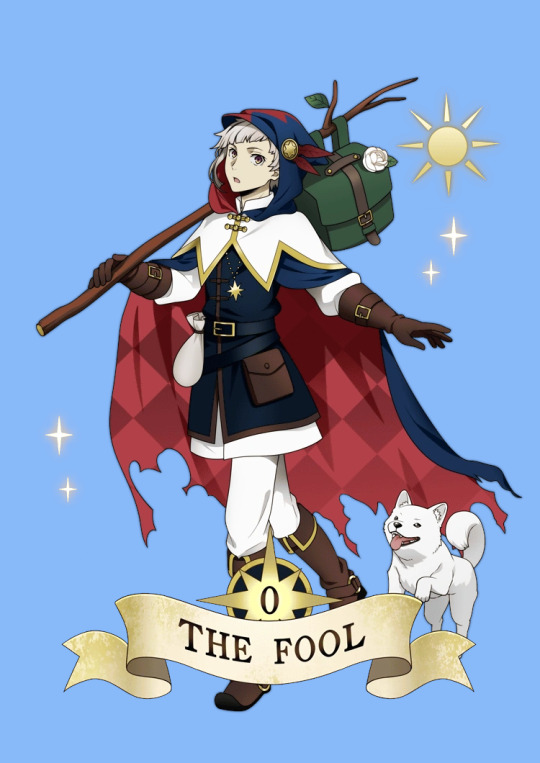
Memo:
Nakajima Atsushi as The Fool tarot card. While initially surprised by the name of his card, after learning of its interpretations, he seems to be deeply moved as he looks back on his past.
Quotes:
- “The name of this card, ‘The Fool’, surprised me at first, but I see it has positive meanings too! I'm kind of relieved...”
- “It also stands for ‘freedom’. Hm... Compared to my old self, I can learn a lot of things, everyone from the Agency is by my side... and I can decide my own path...”.
Description:
The Fool usually gazes at the sky and the universe. Atsushi’s gaze is turned towards the viewer, probably a design decision. But he has his head lifted up towards the sky, still implying the original direction of The Fool’s gaze.
He carries his bag with a branch that rests on his shoulder and the bag contains all the things that he needs. Since it’s not big, it could mean that he either doesn’t need much or that he doesn’t own much to begin with. The white rose on his bag symbolizes purity and innocence. The white dog to his feet symbolizes loyalty and protection.
Normally, The Fool is seen to be at the edge of a cliff, unaware that he could fall into the unknown. Behind him is a mountain, symbolizing the challenges that are about to come. But he doesn’t care about these things right now, he’s focused on starting his journey and to learn the lessons that he came to learn.
Meanings and Interpretations:
- UPRIGHT: (new) beginnings, freedom/free-spirited, adventure, travel, originality, innocence, foolishness, carelessness, idealism, youth, spontaneity, lack of commitment.
- REVERSED: recklessness/risk-taking, carelessness, negligence, stupidity, distraction, apathy, irrationality, lack of fun/hope/faith, holding back.
Atsushi’s reaction at the meaning of his card is not surprising, since the word “fool” is not associated with positive meanings. The Fool in tarot is interpreted as the protagonist of a story and the Major Arcana is the path he must take, which is also called “The Fool’s Journey”. Along his way he meets new teachers and new life lessons and unveils the great mysteries of life. He eventually completes his journey reaching The World card.
Despite its name, The Fool is generally a positive card and the change it brings are seen as a welcome one. It indicates new beginnings, which means that someone is on the start of an exciting and unexpected adventure. On this adventure, The Fool may take a leap of faith, but will grow through this as a result. The adventure may not only be mental, but also physical, where The Fool has to travel to a place they’ve never been before.
Reversed, The Fool still means new beginnings, but it can signify that the person is reluctant to start their adventure or to jump into their new experience. It can indicate that the person is living in the moment, but that they behave recklessly towards others in their excitement.
~ ~ ~
This fits Atsushi, since he is the protagonist of BSD’s main story and his journey starts without him knowing about all the things that are about to come (positive and negative).
Atsushi’s past experiences in the orphanage as well as his isolated upbringing make him somewhat unaware and naïve about the world he lives in and its rules. He is unsure in his own capabilities and hesitates to take a new path unfolding before him (e.g., him joining the ADA). The new beginnings, as well as the dog symbolizing loyalty and protection could be a give and take symbolization for Atsushi. Meeting several characters in his life (especially the ADA members) offers him a new beginning, but he also stands in as a new beginning for these characters.
He is loyal and protective towards people who are important to him, but they also believe in him and are loyal and protective towards him, too. During his journey he takes a leap of faith in trusting in characters that were on the antagonizing side at first (Lucy, Akutagawa, Fitzgerald) and as a result, he grows through these interactions.
If possible, he likes to avoid doing tasks alone due to his lack of self-confidence and experience, which is shown when he questions himself, feels distressed or tries to avoid tough situations. Whenever the situation forces him to rely on himself (e.g., infiltrating Moby Dick) he comes out of it having learned a new lesson. His journey doesn’t only take place in his mind, but he has also physically traveled to a place where he has never been before (e.g., Standard Island).
Negative memories and experiences are something that hold him back throughout the story and make him hesitant in his decisions (e.g., the headmaster’s voice in his mind). He acts recklessly and careless in stressful situations, which causes him to tap into other characters’ traps (e.g., when he was under Q’s curse). During these situations he is not able to move on on his own and needs the help of others (e.g., Dazai scolding him). But he slowly realizes that he is now free from those past circumstances. He embraces the good things in his life and with this gradually moves on from his past.
Yosano – The Empress
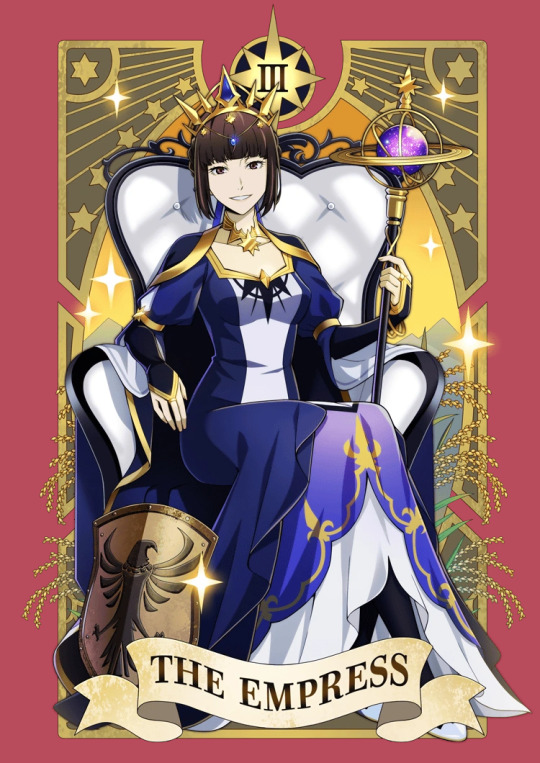
Memo:
Yosano Akiko as The Empress tarot card. While she is not particularly interested in the divination aspect of tarot, she seems to have noticed the similarities between herself and The Empress.
Quotes:
- “Tarot, yes... I am not at all interested in the overly uncertain aspects of divination, but The Empress has a rather beautiful design. I like it.”
- “Apparently, The Empress is associated with vitality. Fufu, ‘vitality’. I like the sound of that.”
- “I can only treat humans. And even then, I cannot treat all humans. I cannot control the vitality of the land like The Empress. Even so, I must do what I can.”
Description:
The Empress sits on a throne as representation of her dominion over growing things. She wields a scepter with her left hand, which represents her power over life. A shield is placed at her feet, the eagle on it is the heraldic emblem of the Holy Roman Empire. She wears a crown with stars, showing her connection to the mystical realm and the cycles of the natural world (usually there are twelve stars, symbolizing the twelve months of the year and the twelve planets).
Golden wheat grows in the foreground, framing her figure and indicating the abundance of harvest. The background is adorned with mountains, instead of a forest as in the original design. The depiction of nature in The Empress’ card signifies her connection with Mother Earth and life itself. She rejuvenates herself by the energy of nature.
The figure of The Empress is often depicted as a pregnant woman, her robe is patterned with pomegranates, the symbol of fertility. She is also mostly adorned with the symbol of Venus (that is sometimes shown on the shield instead of the eagle), which is the epitome of love, creativity, fertility, beauty and grace.
Meanings and Interpretations:
- UPRIGHT: Pregnancy, fertility, motherhood, sensuality, nurturing, creativity, beauty, femininity, nature, harmony, art, abundance.
- REVERSED: Insecurity, infertility, lack of confidence, lack of growth, overbearing tendencies, disharmony, negligence, creative block, dependence on others.
The Empress represents femininity and motherhood. Parents-to-be (mothers as well as fathers) who receive this card are encouraged to build on their communication with their children and to show them their nurturing side. However, even if the person is not a parent The Empress’ message stays the same.
It tells you to embrace your softer side and to listen to your emotions and intuition. People, especially those in need of empathy and compassion, will be drawn to you and you will be able to provide them with your nurturing. Not only does The Empress represent the creation of life, but also of romance, art or business. She symbolizes the emergence of an idea and the need to be receptive to change.
When The Empress appears reversed it tells you to embrace your feminine qualities. This also applies to men, as it is believed in tarot that all humans have masculine and feminine energies that need to be brought into balance. It signifies that a person may have been suppressing or neglecting their feminine side that needs to be embraced.
A person may be too focused on the material and mental aspects of their life and has disregarded the emotional and spiritual aspects. They may be putting the needs of others before their own or they may feel emotionally overwhelmed, so that they neglect the people important to them. It is advised to shift your focus in these situations and to ground yourself to get back to your inner balance.
~ ~ ~
Yosano is not associated with pregnancy or motherhood per se (since she is not a mother), but her role as a doctor and her ability can be interpreted symbolically in that way. She “creates” life or “gives birth” by bringing people back to life. She “nurtures” life by healing severe wounds.
This fits with her story arc, because she started her medical career already in her childhood. What began as a forced work during the war, turned out be a good blessing at first. The soldiers were in awe with her and her restoring ability, they were thankful and drawn to her nurturing side.
However, this turned out to be seen as the exact opposite, when the soldiers gradually experienced more trauma due to them being brought back to life over and over again. The same people now behaved hostile towards Yosano, involuntarily earning her the title “the angel of death”.
This trauma and abuse led to Yosano suffering herself, because she was forced to put the need of others before her own. This then led to her despising her own life and ability. She became visibly miserable and just a shell of who she once was, believing that she only brought demise to other people.
It was only when Fukuzawa and Ranpo found her that she started to gain hope and strength, because she was told that they were not interested in her ability, but in her kindness for others.This was the start for Yosano to realize that it’s not her supernatural ability alone, but also her mind and intentions that can help people, and marks the start of her career as the ADA’s doctor (even without her ability she is still a doctor and even without that she still values life and wants to save it).
Through her experiences she now knows the limits of her own abilities (both her supernatural ability and her abilities as a doctor), which can be seen in her reaction to her card. She still hasn’t given up on her work and duty, despite her negative memories. She won’t be losing track of herself, because she now has people at her side who truly care for her.
Kenji – The Chariot
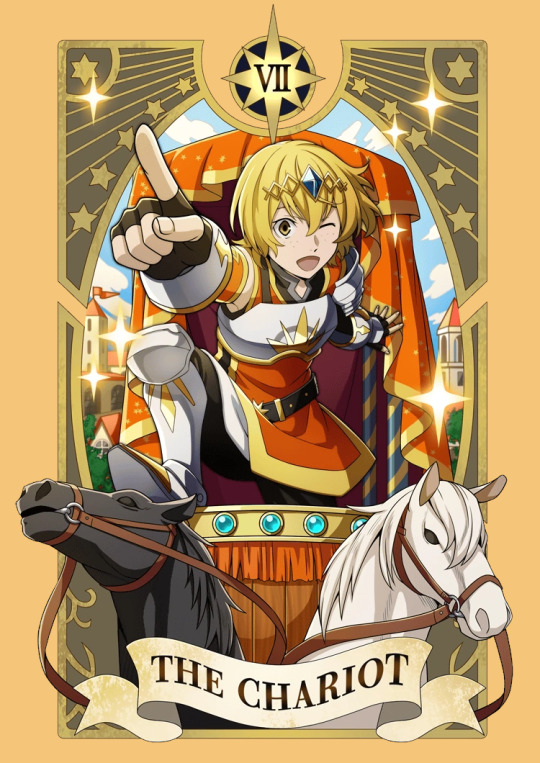
Memo:
Miyazawa Kenji as The Chariot tarot card. He seems very interested in the illustrations of the brave horses and their chariot. The two horses depicted on the card remind him of his days back in Ihatov.
Quotes:
- “The Chariot looks so valiant! And it has two horses! I bet they're good horses.”
- “Apparently, one of the meanings of The Chariot is ‘the ability to take action’. Hmm~, I can't really tell, but what do you think? Do I have that?”
- “I think it would be so fun if I could do my detective work with horses like the boy on this card! If I worked with horses, I feel like I'd be able to do a lot more!”
Description:
Kenji is depicted as armored warrior. His laurel crown (although heavily altered in design) symbolize victory, success and spiritual evolution. The figure of The Chariot usually stands tall inside his chariot. In Kenji’s case that has been upgraded and exaggerated to him standing with one foot on the foreside and pointing with one finger ahead. A heavy indication of taking action and moving forward.
In front of the chariot are two horses, which represent positive and negative opposing forces and duality. The two horses pull in different and opposing directions, yet The Chariot uses his willpower and sheer resolve to move them in the direction that he wants. He doesn’t need to hold reins to move, instead he controls it through the strength of his will and mind.
In the original card’s design, the armor of The Chariot is decorated with crescent moons, which represent what is coming into being, a tunic with a square, representing the strength of will and other alchemical symbols that are a representation of spiritual transformation.
The canopy above his head is adorned with six pointed stars that indicate his connection to the celestial world and the divine will. Instead of horses, two sphinxes are in the foreground. A city with a large river can be seen behind The Chariot, symbolizing the need to be in flow with the rhythm of life while charging ahead towards your goals.
Meanings and Interpretations:
- UPRIGHT: victory, overcoming obstacles, success, ambition, determination/willpower, control, self-discipline, hard work and focus, action.
- REVERSED: forcefulness, lack of direction, lack of self-control, powerlessness, aggression, coercion, being blocked by obstacles, opposition.
The Chariot upright represents overcoming obstacles through determination, focus and willpower. The person may feel motivated, ambitious and in control, therefore they are encouraged to go for what they want. There may be challenges and obstacles in The Chariot’s path, but if you stay focused and believe in your own abilities, you will be able to overcome these. The Chariot can also represent travel, as it is a means of transportation.
People who receive this card may feel like they are fighting a battle and because of that act defensively or aggressively to hide that they are emotionally vulnerable at the moment. In this case, you are encouraged to find balance between the heart and the mind. The Chariot also indicates success in sports and competitions.
The Chariot reversed means that a person may feel powerless and lack direction and confidence. They may feel put upon by others or the circumstances in their life. This can lead to anger and frustration as well as uncontrolled aggression. The Chariot advises you that you need to take control of your own destiny and to not let outside forces determine your path.
It indicates that you need to set boundaries and stick to them and to be clear about the time and resources you are willing to dedicate to others. If people in your life become too needy and demanding the person is advised to take back their own power.
~ ~ ~
Kenji starts his story by moving from the land to the city. His decision to leave his family and village, live in the city and to work for the ADA can be interpreted as him moving forward in a physical and spiritual sense. He is willing to challenge his new surroundings and grows through this as a result.
He has shown to be very confident in himself and his abilities, being the most optimistic of the group and to always look on the positive side of things. Tough situations do not worry him much, because he believes the outcome will work out just fine.This determination also transfers to other characters when they are with him and should they find themselves in a distressed situation (e.g., when he had his mission with Atsushi who was constantly worried about how Kenji does his work).
Being able to control something with his pure willpower could also be interpreted as an allusion to his supernatural ability that allows him to lift up cars or tear down stone walls on a whim. However, Kenji’s ability relies on the fact that he needs to be hungry in order to use it and the ADA members also advise to not disturb him when he is sleeping, because he will get irritated and aggressive in that state.
Kenji has been shown to not only be able to get over physical obstacles, thanks to his ability (e.g., bringing Fukuzawa out of the hospital). He is also able to encourage his peers to get over mental obstacles (e.g., his speech to the ADA when they flee from the HD).
Kunikida – Justice

Memo:
Kunikida Doppo as the Justice tarot card. Having always stood for justice and ideals, Kunikida has a favorable impression of this card.
Quotes:
- “Justice... What a well-named card. The sword and scale illustrations aren't bad either.”
- “I have no desire to sit on a throne, but I value fairness, which is one of the meanings this card holds. I want to uphold this as I carry out my Agency duties.”
Description:
Kunikida as the figure of Justice sits on a throne, holding a sword in his right hand and scales in his left hand. The sword points upwards, symbolizing a firm and final decision. Its double-edged blade is a reminder that our actions always carry consequences. The scales show that intuition must always balance logic and are a symbol of impartiality.
He wears a crown with a small square on it, a representation of well-ordered thoughts. His white shoes looking from underneath his robe also symbolize that our actions have spiritual consequences.
The figure of Justice sometimes is depicted in front of a loosely hung purple veil, which signifies compassion. Two pillars frame the figure, symbolizing balance, law and structure.
Meanings and Interpretations:
- UPRIGHT: justice, karmic justice, consequences, legal disputes, law, truth, honesty, integrity, cause and effect, life lessons, fairness.
- REVERSED: injustice, karmic retribution, dishonesty, corruption, lack of accountability, dishonesty, unfairness, karmic avoidance.
In an upright context, the Justice tarot card is a representation of karmic justice, legal matters, cause and effect. Justice symbolizes truth and integrity and can imply that a person may feel the urge to speak out the truth. This person values honesty and integrity in others, too.
Justice also relates to balance and signifies that an event may occur that is beyond a person’s control or their own making. In these moments Justice encourages the person to keep themself level-headed as the events unfold. It also signifies that a person is about to make a choice and that they are currently weighing all their options. In legal matters, this card shows that the outcome will be a fair and balanced result.
Reversed, Justice means injustice and the avoidance of karmic justice. It symbolizes that a person has been treated unjustly or that they are in a situation where they are being affected unfairly by the choices and actions of others. The person may feel victimized or blamed for something that isn’t their fault. Justice reminds the person to still keep their balance. If the person created the situation themself, it is advised to think about how they can react to that situation. It also signifies that the person must be accountable, if they created the situation by bad choices and actions. This means that the person should not blame others and to be more self-aware.
It can also symbolize dishonesty and that a person should not lie their way out of something or try to justify it. The person may also have hardline views in their life and prejudices the people around them. In legal matters, Justice indicates that the result will be one of injustice or that the outcome may not what the person has hoped for.
~ ~ ~
Kunikida is practically the personification of justice of all of the ADA members and justice is also something that he has been shown to think about a lot. He takes his work very professional and serious and tries to bring every case to a fair result. If he isn’t able to save people, he calls out the unfairness of the situation (e.g. when he tried to save the abducted victims in the Azure Messenger case.) This shows that he feels responsible and guilty even for events that were out of his control.
He seems to try to balance his own life by sticking to his written ideals and calls others out shouldn’t they behave in the same way (e.g. mostly seen when Dazai is neglecting his work). If he notices that people are distressed during a bad situation, he reminds them to keep their balance or he tells them to think about what they can do (e.g. to Atsushi when the Black Lizard attacked the ADA office). But he also reminds himself about these things (e.g., seen when he was told by Jouno that he felt relieved about the ADA getting caught and with this his ideals falling apart. But then he got back to his knees and defended the ADA, so that they could escape.)
When Kunikida meets new people, he keeps up his guard and distance at first, and holds prejudices about them (e.g. when he met Dazai, Atsushi and Kyouka). This can lead to him having a wrong first impression of people (negative and positive) and with this easily fall into traps (e.g., when he did not realize that Sasaki was the Azure Messenger).
This implies that he first weighs to be careful about whom he trusts (in this case a new colleague), and changes his mind about them later, once they have proven to be trustworthy.
Tanizaki – Temperance

Memo:
Tanizaki Junichiro as the Temperance tarot card. While he initially tilted his head at the card's rather strange design, he faces its mystical aura head-on. He seems to have interpreted the card's meaning in his own way.
Quotes:
- “The person on this card is pouring liquid from one cup into another... What on earth for?”
- “So, Temperance also means ‘harmony’. Hm, am I harmonic? Oh, sometimes I sort things out when there's a commotion at the office... so I guess I am?”
- “Hmm, so it means ‘devotion’ too... The only person I'm devoted to is Naomi. To me, Naomi is irreplaceable.”
Description:
Tanizaki balances himself with one foot on land, representing the need to stay grounded and the other in the water, representing the need to be in flow. The water he pours between two cups are the symbol of the flow and alchemy of life. This was a standard symbol of Temperance as one of the cardinal virtues, as it represents the dilution of wine with water.
In many decks, the figure of Temperance is depicted as winged angel, but instead we see two feathers, probably meant as surrogate of the angel’s wings. The background shows a path leading to a mountain with a golden crown on top, but this depiction has been changed in Tanizaki’s card and the golden crown rests upon his own head instead. The crown is a symbol of taking the higher path and staying true to one’s meaning and purpose in life.
Meanings and Interpretations:
- UPRIGHT: Balance, peace, patience, moderation, inner calm, perspective, tranquility, harmonious relationships, soulmates, purpose.
- REVERSED: Imbalance, self-indulgence, excess, clashing, lack of perspective, discord, antagonism, recklessness, hastiness, self-healing, re-alignment.
Upright, Temperance indicates that a person has found their inner calm and peace. They have a good perspective on things and care about harmonious relationships. It signifies feeling content and having found tranquility. Temperance shows that a person is in touch with who they are inside and what they value.
They have their own moral compass and have learned not to get dragged into other people’s conflicts. Minor issues won’t knock them off balance, instead they adapt to the situation with a clear mind and a calm heart. Figuring out your aspirations and your goals is easier for people who get this card in their readings.
In a reversed position, Temperance means imbalance. It signifies that a person behaves in a reckless manner. The person may have lost touch with their inner calm and peace, which leads to them seeking gratification in harmful and risky ways (like alcohol, drug use or gambling).
It can also mean that the person has a lack of harmony with the people in their life and due to this the person may lash out to people close to them, which then causes them to get dragged into drama. In these situations, it is advised to take a step back and look at how you are behaving, because you may lack to see the bigger picture. Examining the root causes and working to resolve them is the way back to your inner calm and peace.
~ ~ ~
Tanizaki appears to be one of the calmest people in the ADA. He does not get into quarrels with others, even if he is wary or hesitant about their ideas (e.g., giving in to Naomi’s demands and shenanigans, hesitating and getting tricked by Dazai to participate in Atsushi’s entrance exam).
Although, he is nervous on missions, he still takes them on with a clear mind and a professional approach. Many missions are entrusted to him alone, showing that people know that he can handle the situation just well.
His decision to work for the ADA could imply that he has found his goal and his purpose in life. His dedication to Naomi shows that he is patient and calm, and that he cares deeply for a harmonious relationship between them. Keeping her safe above all things indicates that he’s sees it as his purpose in his life, too.
However, Naomi is also his biggest weak point. Whenever she is in danger or hurt, Tanizaki gets knocked off his balance and inner calm. These situations make him hastily jump into actions and due to this he becomes an easy target for others (e.g., when he attacked Higuchi out of anger, he didn’t notice Akutagawa; when he was about to kill Mori to save Fukuzawa, he tapped into Kouyou’s trap).
Even though this does not only concern Naomi’s well-being, as he has also been shown to make rush conclusions, if other people he cares about are in danger or in a predicament (e.g., when Fukuzawa was about to die due to cannibalism; offering to join PM as exchange instead of Yosano). His work as a detective on this aspect lets him also get regularly dragged into other people’s drama, either the drama of clients or the drama of other ADA members.
~ ~ ~ ~ ~
Sources: www.biddytarot.com | www.thetarotguide.com | https://en.wikipedia.org/wiki/Major_Arcana
#atsushi nakajima bsd#akiko yosano bsd#kenji miyazawa bsd#doppo kunikida bsd#junichiro tanizaki bsd#Atsushi Nakajima#Akiko Yosano#Kenji Miyazawa#Doppo Kunikida#Junichiro Tanizaki#bsd meta#bsd analysis#Bungou Stray Dogs#bsd mayoi
259 notes
·
View notes
Note
thank u for replying, you are so kind!! i love love love your blog btw!! i really love history but im so tired of the stigma it comes with of being a “useless” field. do you often have to battle this? and also what career are u looking to pursure? and just for fun, whats ur fav thing you’ve learned in your classes! thank u sm, i think ur awesome
Hi !!! thank you so much🥺💜
I’d like to start by saying that this morning I had written part of this reply, and then tumblr decided that it did not want to save my draft so all of that has self-destructed. I had written a long thing to answer to your first question, and I will now try to emulate that as best as I can, because it’s a subject very dear to my heart.
So, you are right unfortunately A LOT of people think that history is useless, and everytime I hear this argument I get really scared, because not knowing where you come from and what happened in the past makes you so vulnerable and manipulable. It is fundamental for us (whether you work in the field or you are just passionate about history) to fight this concept, everyone has to understand how important it is to know our history. In my self-destoyed answer of this morning I went on talking about this a lot, I’m going to just say a couple of things now, but if anyone is interested in the topic I will gladly articulate this more.
A couple of things on why history is so important, as I said knowing what humans did in the past (both the good and the bad, expecially the bad) makes us more aware of what is happening today. It gives us a way to deduce how things will unfold, we can understand our present and how our future is going to be. Knowing our past gives us power, we can be less manipulated and controlled, we can stop certain bad things from happening, we can avoid repeating old mistakes. Another thing that is very dear to me is that by knowing history we can stop all those people who manipulate history for their own purpose. I will now explain myself a bit better. Throughout history many groups have manipulated history to back up their “theories” and “ideologies”, (as well as goverments that have hidden /manipulated history to better control people, and beware this is still happening today). I am thinking about how fascism tried to connect its roots to the roman emipire, and how a lot of nazis try to connect their bullshit to vikings and norse culture. This causes many problems, because if we are unaware of how history actually unfolded we can fall into their trap, and believe that they actually have roots in history, when in fact they do not at all. By doing this we would betray history, just as much as they do, and we would fall into their game, which is of course something we want to avoid. All that history tells us about these groups is how much damage they have done. It is our duty to protect history against them, and the knowledge of history will protect us in a way, because we won’t repeat the past. The roman empire got so big and powerful and lasted for so long because of the amazing integration of romans, they accepted, adapted and integrated. The empire started to fall apart when this integration started to decrease. Talking about the vikings, they were merchants and they traided with far off lands and to do so they came in contact with new cultures. Many of them became part of these new cultures. Also viking women had so much importance in their society, both socially and militarywise.
I got kinda carried away again, but as I said this topic is really important and dear to me, and I will gladly go on talking about it if necessary. So yes, you will face a fight against people who will say that history is of no use, I trust in you to fight againt it, always.
To answer to you other questions, careerwise I will admit that I started university without much of a plan other that to study stuff I loved. I had finished high school feeling very unmotivated and almost resenting my old school, and so I wanted to study something that would have made me happy to wake up in the morning. At the moment I still don’t have a precise plan, if we want to talk about dreams, I would love to work in some ways in divulgation (I’m talking about books, documentaries, etc), I also love research, but unfortunatly nowadayss it doesn’t pay enough to survive only on that. Honestly I would not mind working with museums aswell, we’ll se what the future holds for me. I’ll turn this question around to you, what would you like to do, if you end up choosing history in school?
There’s A LOT of fun things I have learnd in my classes, I adored all the classes that taught me how to actually be an historian, so how to work first hand with historical sources. Trust me that can be intimidating at first but then it ends up being one of the most amazing things ever. Some of my other favourite classes were queer history (absolutly amazing, I learnt so much), anthropology of religion (I also did history of religions which was very good but the prof was kinda mean to me at the exam), and then I mean all the basic history eras were super interesting, I did some amazing readings! If you were referring to fun facts I learned in classes just tell me and I will tell you about some crazy things I learned.
Thank you so much for the questions and sorry if I went a bit off topic, if you have any other questions always feel free to ask !! I hope you'll have a great day! 💜🌿
#ask#answered#answer#historyblr#history#cris speaks#the---hermit#ps I'm sorry if I made some mistakes writing but I wrote this from laptop#and I tend to write really quickly and sometimes I make a mess
6 notes
·
View notes
Text
Who is Orange?
Disclaimer: Please enjoy? Accept? Beware? This… Thing that started out as character analysis and turned into a deranged fanfic, because I experienced a literal revelation mid-way through free writing. I did not clean this up much because I’m still reeling from the theory implications myself. I cursed a lot.
~
What does Orange Side represent?
What do we know?
Orange is a “Dark Side”, defined as being one of the Sides hidden from C!Thomas.
The other Hidden Sides were Janus, Remus, and Virgil.
All the Hidden Sides were hidden due to a key aspect of their character that C!Thomas had to first acknowledge and then accept. Virgil required C!Thomas to acknowledge that he had heightened anxiety and accept that anxiety isn’t inherently wrong, just a different form of information that can be processed. Remus required C!Thomas to acknowledge that he had intrusive thoughts and accept that those thoughts don’t make him evil; they’re just thoughts. Janus required C!Thomas to acknowledge that he was capable of lying and accept that acting “selfishly” sometimes isn’t just okay, but actually critically important to managing stress.
What are the common themes here?
Confronting the reality about ourselves instead of pretending some traits don’t exist.
Understanding ourselves to be more complex than ‘good’ and ‘evil’.
Addressing mental health.
Orange Side is still hidden, but we can expect him to be something C!Thomas doesn’t want to (or isn’t ready to) acknowledge. Something that would be difficult to accept about oneself. All Hidden Sides fall under the jurisdiction of Janus, so let’s take another look at him.
In “Can Lying Be Good?” we get a lot of information about what Janus’ purpose is:
Roman: It you really don’t want to know something, he… can keep our mouths shut.
Logan: You don’t want to believe it. That’s where his power comes from. Things that you want to believe. Things that you wish were true. And things that you wish weren’t.
Deceit: What you don’t know can’t hurt you.
This all means that Orange Side is something that would cause C!Thomas distress to learn and something he subconsciously wishes weren’t true. This is not new information to most of you: the spin-off interpretations of Apathy and Pride are widely popular fandom theories, traits that are typically viewed as negative in large doses.
But the Hidden Sides being seen as something negative isn’t their only defining characteristic. They typically involve an aspect a mental health, involve societal expectations, and... what is it...
Janus is the umbrella over all the other Hidden Sides, sheltering and obscuring them from view. He is the gatekeeper in a very literal sense. What is he gatekeeping?
What is it? What is it what is it, why? What does he do? What seems bad but isn’t? What can he do? What issue is actually useful? What’s useful what’s useful WHATS USEFUL WHATS USEFUL?! WHY DOES IT HAVE TO USEFUL?
shitshitSHITSHISTHISTSTs
I KEPT ASKING MYSELF, WHAT’S USEFUL? WHAT TRAIT COULD IT BE THAT APPEARS BAD, BUT ISN’T BAD, IS ACTUALLY USEFUL. ANIEXTY WAS OKAY BECAUSE HE WAS JUST LOOKING OUT FOR US. LYING WAS OKAY BECAUSE HE JUST WANTED TO PUT C!THOMAS FIRST. INTRUSIVE CREATIVITY WAS OKAY BECAUSE DARK IDEAS OPEN UP NEW PATHS.
But the whole GODDAMN POINT is ACCEPTANCE!
You don’t HAVE to be useful to be accepted. You – yuo just BE. YOU BE!
PEOPLE don’t have to prove their Usefulness to you before you can treat them with respect. Our WORTH does not depend on what we PRODUCE. YE GODS, THE COGNITIVE DISSONANCE I JUST BROKE-
~~~
C!Thomas comes back from his self-care stay-cation. He’s ready to start production, he is rested and refreshed. BUT JUST LIKE EVERY PREVIOUS DILEMMA, it isn’t Good enough, Original enough, Fast enough. He’s done everything right, why is it still wrong? He’s accepted his anxiety, he’s accepted that things aren’t just black and white, he’s Accepted That It’s OKAY to have Dark Thoughts, he Has ACCEPTED SELF_CARE. Why Isn’t IT ENOUGH?!
“Fuck it.”
C!Thomas spins in his chair, looking at a man that looks just like him, but not quite.
“What?”
“Fuck it. Fuck them.”
“You sound like Remus,” Thomas jokes. He’s lying, of course. He’s nervous. The Side looks like a normal guy, but something about him is unsettling. The unidentified Side just presses his lips together, unimpressed.
“Um, ef w-who, exactly?” Thomas asks, but part of him already knows.
“All of them. Every person who isn’t you. Every person who expects something from you.”
“Now, you sound like Janus.” Thomas looks back at the computer screen, but the Side’s retort has him spinning around again.
“Janus is a short-sighted pseudo-rebellious minion of a capitalistic society, just like the rest of them.”
“Uh, excuse me?!”
“Isn’t it obvious? They’re all obsessed with Success. Whether they want to play by the rules, or manipulate them, or break them, whether it’s making money or pumping out good deeds, they’re still just trying to make you be successful within the framework of a system that prioritizes production over a human life.”
Thomas just stares for a moment before he can find his voice.
“Who are you?”
“Dude, seriously?” He waves his hands, palms up and presenting himself. “I’m Achilleus. I’m your motivation.”
~~~
Take a deep breath and follow me down the research black hole, where every topic I looked up was more and more terrifyingly appropriate:
Freedom
noun
the power or right to act, speak, or think as one wants without hindrance or restraint.
Self-Determination
noun
the process by which a person controls their own life.
Autonomy
noun
(in Kantian moral philosophy) the capacity of an agent to act in accordance with objective morality rather than under the influence of desires.
Autonomic Nervous System (because i believe each Hidden Side is closer to the subconscious)
noun
the part of the nervous system responsible for control of the bodily functions not consciously directed, such as breathing, the heartbeat, and digestive processes.
Inherent Value
“inherent value in the case of animal ethics can be described as the value an animal possesses in its own right, as an end-in-itself” – Animal Rights – Inherent Value, by Saahil Papar
Intrinsic Value
“Intrinsic value has traditionally been thought to lie at the heart of ethics. Philosophers use a number of terms to refer to such value. The intrinsic value of something is said to be the value that that thing has “in itself,” or “for its own sake,” or “as such,” or “in its own right.”” – Intrinsic vs. Extrinsic Value, by Michael J. Zimmerman and Ben Bradley
“Finally, his sense of respect for the intrinsic value of entities, including the non-sentient, is the Kantian notion of the inherent value of all Being. This is based on the notion that a universe without moral evaluators (e.g. humans) would still be morally valuable, and there is no reason not to regard Being as inherently morally good.” – Technology and the Trajectory of Myth, by David Grant, Lyria Bennett Moses
Motivation
“Another way to conceptualize motivation is through Self-Determination Theory … which is concerned with intrinsic and extrinsic motivation. Intrinsic motivation happens when someone does something for its inherent satisfaction.” – Second Language Acquisition Myths: Applying Second Language Research to Classroom Teaching, by Steven Brown, Jenifer Larson-Hall
Capitalism
“The flowery language of the United States Declaration of Independence would have you believe that human life has an inherent value, one that includes inalienable rights such as “life, liberty, and the pursuit of happiness.” But in America, a major indicator of value is actually placed on being a productive member of society, which typically means working a job that creates monetary revenue (especially if the end result is accumulated wealth and suffering was inherently involved in the process).” – The Diminished Value of Human Life in a Capitalistic Society, by Seren Sensei
Religion
“At the heart of the debate between Calvinism and Arminianism lay the insurmountable chasm between God’s sovereign election versus human self-determination.” – Sovereignty vs. Self-determination: Two Versions of Ephesians 1:3-14, by Reformed Theology
Mythology
“In Classical Greece, Achilles was widely admired as a paragon of male excellence and virtue. Later, during the height of the Roman Empire, his name became synonymous with uncontrollable rage and barbarism… He chooses kleos (glory) over life itself, and he owes his heroic identity to this kleos. He achieves the major goal of the hero: to have his identity put permanently on record through kleos…
“But is this really an accurate characterization of Achilles' pivotal decision? Is he really driven to sacrifice his life by an obsessive quest for honor and glory? One scene in the Iliad suggests the answer to both questions is no.
“When Achilles leaves the battlefield after his dispute with Agamemnon, the Trojans gain the upper hand on the Greeks. Desperate to convince their best warrior to return, Agamemnon sends an envoy of Achilles' closest friends to his tent to persuade him to reconsider his decision. During this scene, Achilles calmly informs his friends that he is no longer interested in giving up his life for the sake of heroic ideals. His exact words are below:
“The same honor waits for the coward and the brave. They both go down to Death, the fighter who shirks, the one who works to exhaustion (IX 386-388)…
“Not only does Achilles reject the envoy's offers of material reward, but he rejects the entire premise that glory is worth a man's life.” – making sense of a hero’s motivation, by Patrick Garvey
Achilles (/əˈkɪliːz/ ə-KIL-eez) or Achilleus (Ancient Greek: Ἀχιλλεύς, [a.kʰilˈleu̯s])
Achilles realizes his own inherent self-worth, thereby freeing himself from the expectations of others; societal or otherwise. Only once we are free can we find the balance between our own needs and the needs of others in a way that breeds neither anger nor resentment in either.
~~~
But that’s... that’s just... a theory. Huh.
#sanders sides theory#orange side#orange side theory#sanders sides#character thomas#cursing tw#swearing tw#dark sides#the others#janus sanders#virgil sanders#remus sanders#orange sanders#caps tw#name theory#long post#missfay#my writing
110 notes
·
View notes
Text
Special 300 followers post: places to visit while in Romania (1/5)
I know this post is long overdue, sorry for stalling posting this, but it was hard to think of just a couple of places to visit. Sadly, my mission to bring just a couple of places to visit failed, and I have 40 places to talk about in this post. So, with that said, in no particular order (beside an alphabetical one), here are 40 places to visit while in Romania:
1. Alba Iulia:
Alba Iulia, the seat of Alba county, has a historical significance for Romania. Since the Dacians lived there, the city was an important economical, political and social centre, known back then as Apulon. Once the Romans arrived, they renamed it Apulum and the XIII Gemina Legion was stationed there. Apulum is the largest Roman castrum on the current territory of Romania.
Alba Iulia has also a history of siege, military victories, and unions. The catholic cathedral still has canon marks from a siege by the Ottomans in 1442. In 1599, Michael the Brave entered victoriously the city after the battle of Șelimbăr, becoming Voievode of Transylvania (and soon after uniting Transylvania and Wallachia with Moldavia) and in 1918 the city was chosen for the declaration of union of Transylvania with the Kingdom of Romania, and 4 years later, King Ferdinand of Romania was symbolically crowned there as King of Romania. Each year, on the 1st of December, there are celebrations held in Alba Iulia, as in the rest of Romania, to celebrate the Great Union, but Alba Iulia remains the spiritual center of the event, and I wholeheartedly recomend visiting it in that period.



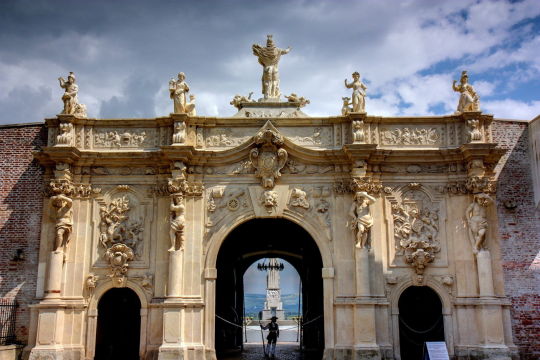
2. Sculptural Ensemble of Constantin Brâncuși at Târgu Jiu
The Sculptural Ensemble of Constantin Brâncuși at Târgu Jiu is an homage to the Romanian heroes of the First World War.
The ensemble comprises three sculptures: The Table of Silence (a circular stone table surrounded by twelve hourglass-seats, which symbolize time), The Gate of the Kiss (it features a kiss motif on the gate pillars; the transition to another life occuring through it) and the Endless Column (symbolizes the concept of infinity and the infinite sacrifice of the Romanian soldiers), on an axis 1,300 m (4,250 ft) long, oriented west to east. The ensemble is considered to be one of the great works of 20th-century outdoor sculpture.


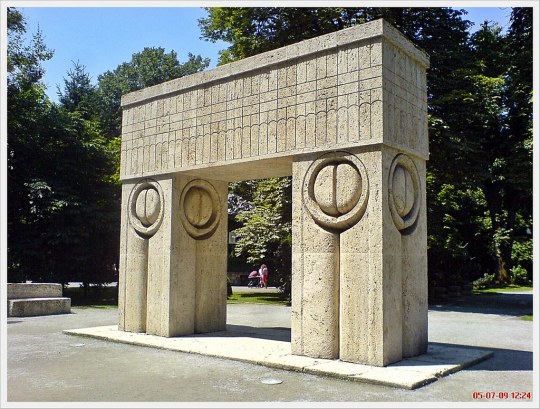

3. Black Church
Biserica Neagră or, as it would be translated, the Black Church, is a church build by the German community in Brașov, being the most important Lutheran place of worship in the region and Romania’s main gothic style monument. When it was finished, it was so big (89 meters/292 feet in length and 65 meters/213 feet in height) that it was declared the biggest church between Vienna and Constantinople.
When visiting, you may want to pay attention to schedule, since in summer time, there are pipe organ concertos three times a week, from musicians across both Romania and other places.


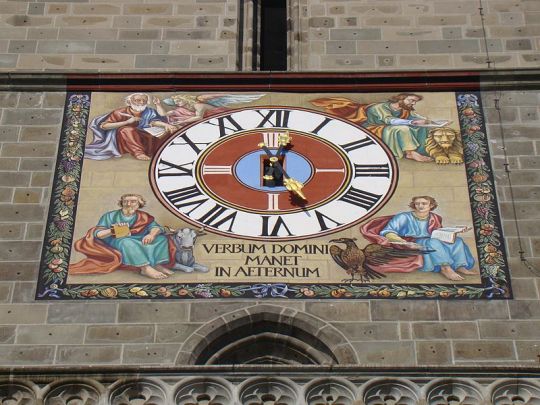

4. Bran Castle
Castelul Bran or Bran Castle (or, as much as I hate to say it, Dracula’s Castle) is a national monument and landmark in Romania. Bran Castle was built by the Transylvanian Saxons of Brașov as a defensive fortress against the Ottoman Empire, and now is a museum dedicated to displaying art and furniture collected by Queen Marie of Romania.
When visiting the Castle, beware the presence of Dracula, as the area is chocked by shops and tourist traps dedicated to the fanged count, but, sadly, this castle may be errenously known as the inspiration for Bram Stoker’s book, but there is evidence that he never visited the place, and the description does not match the actual castle. While you are there, please visit the ethnographic museum, which is close by, and take a breath of the authentic local culture, and not a breath of the stereotypical vampires. There is more to Bran than Dracula and vampires.


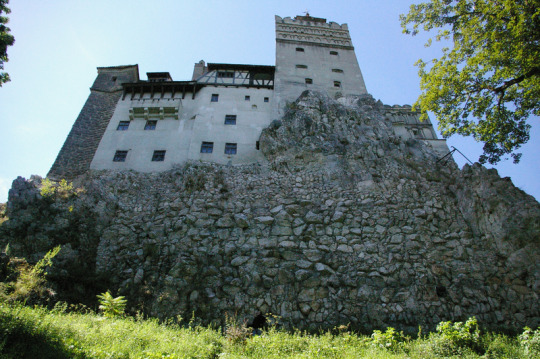
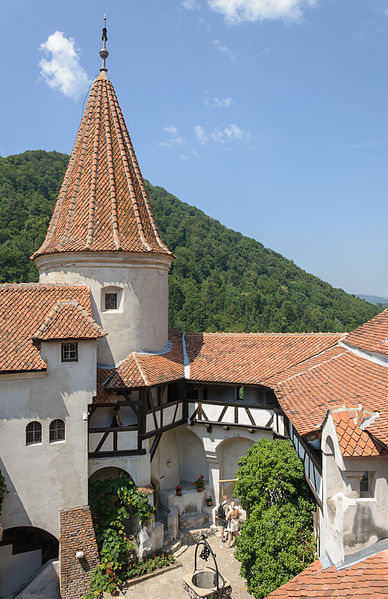
5. Cantacuzino Castle
Castelul Cantacuzino or Cantacuzino Castle is a building completed in 1911, at the request of Prince George Grigore Cantacuzino. The building has a Neo-Romanian style, and belonged to the noble Cantacuzino family, until 1948, when the building was forcefully nationalized and transformed into a preventorium.
The Castle is now a museum, but I have to say, it is sad to visit it. During communism, the building can be said to have been vandalised: the original wall decorations in some rooms were painted over, in some rooms it is 3 layers of paint, in one there are 6. The original furniture was removed, and the family emblem on doors was removed. Seeing and hearing about the damage made my heart ache when I visited it. After the Revolution, the building was given back to the descendants of the Cantacuzino family, who then decided to sell it to private investors. Today, it is open to the public, but, if I recall correctly, the descendants sometime come together at the castle, to have family reunions.
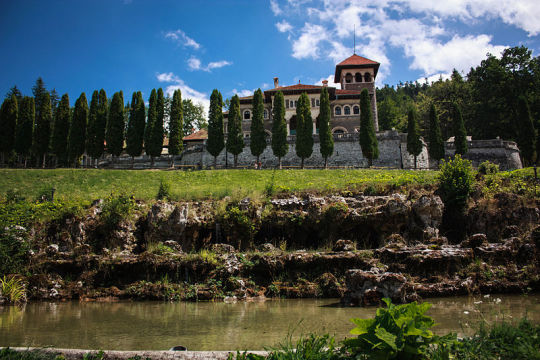

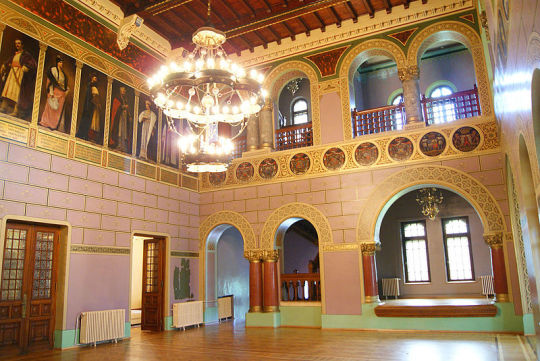
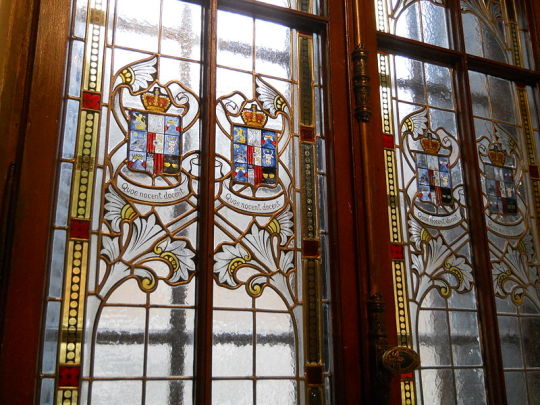
6. Hunyadi Castle
Castelul Huniazilor/Corvinilor or Corvin/Hunyadi Castle is a Gothic-Reneissance Castle in Hunedoara, being one of the largest castles in Europe.
Being known as one of the most beautiful castles in the world, its history began in the 15th century, but the castle is now standing because of a vigurous restoration campaign after a desastrous fire and years of total neglect. The Castle has been featured in different movies and TV shows, the most recent one being 2018′s The Nun, being named as “Cârța Monestary“ in the movie.
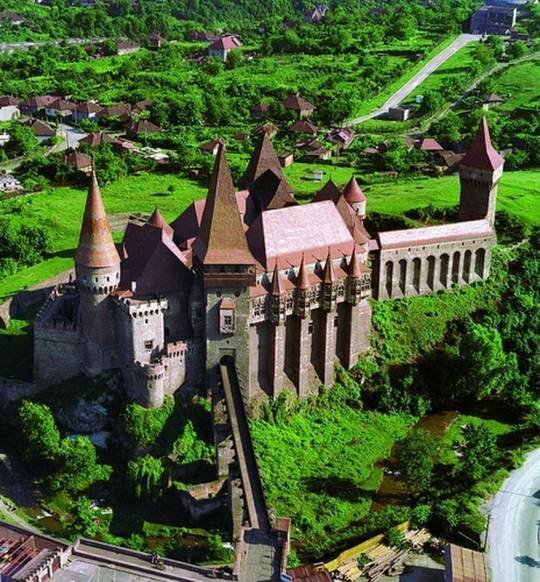
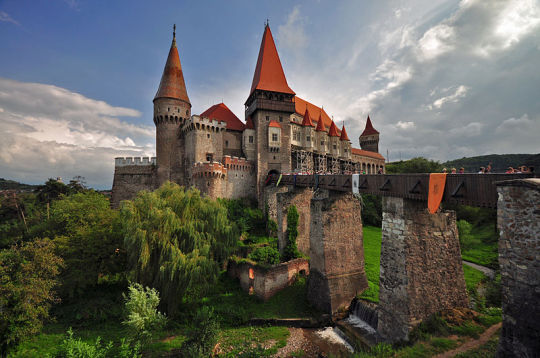

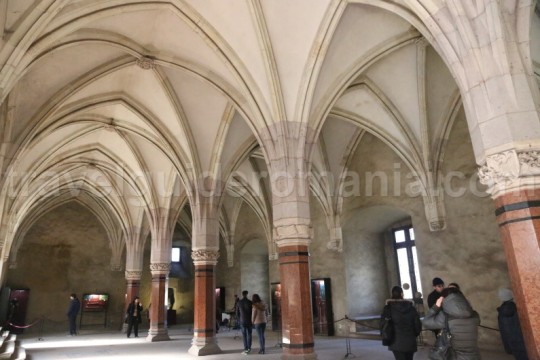
7. Peleș Castle
Castelul Peleș or Peleș Castle is a Neo-Renaissance castle and former royal summer residence located near Sinaia, constructed for King Carol I, the first King of Romania.
The Castle is placed in a beautiful sceneric zone, being able to somewhat transport you back in time to the monarchical era. Peleș, much like the Cantacuzino Castle, was nationalised after the forced abdication of King Mihai, but it has been preserved and returned to the royal family of Romania, which allows the museum inside to still function. Near the Castle, there is one more location I recommend visiting: the smaller Pelișor Castle, which was very dear to Queen Marie of Romania, so much so that her heart is kept in the room it stopped beating. Both castles are jewels of architecture among Romanian castles, and are a must when it comes to visiting Romania.
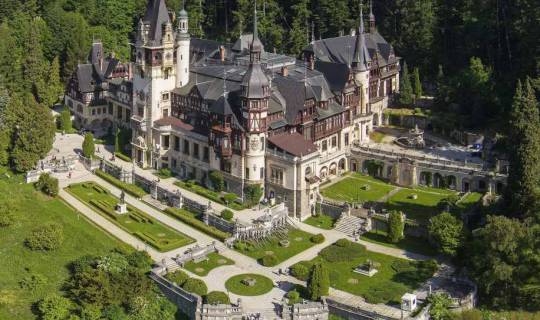


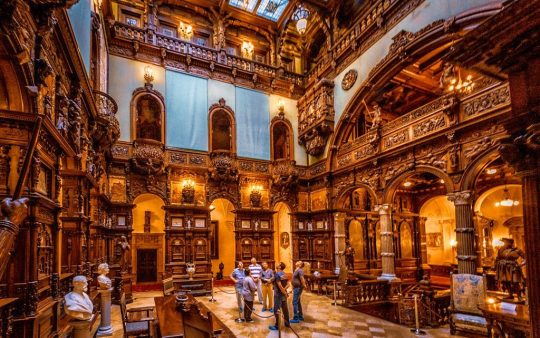
8. Cazanele Dunării
Cazanele Dunării is a sector of the Defileul Dunării region, the region where the Danube has carved out its path over centuries through the Carpathians. The area showcases beautifully the wonders of nature, conquest and ordinary life of cultures iving by the course of a river.
There are 4 hour cruises leaving the town of Orșova, on these cruises you can see the surrounding landscape, small monestaries and two important monuments, one ancient and one modern, but both tell the story of how the Romanian people formed by tradition: the ancient Tabula Traiana, a Roman plaque to celebrate the victorious conquest of Dacia by Emperor Trajan, and the modern carved head of Decebal, the last king of the Dacians, who fought Trajan, until he killed himself to avoid a shameful capture. If you wish to visit other places, the border with Serbia is very close (the Danube itself is the border), and the surrounding towns and villages are very ethnically diverse, giving a taste of Serbian, Romanian, even Czech and German culture.


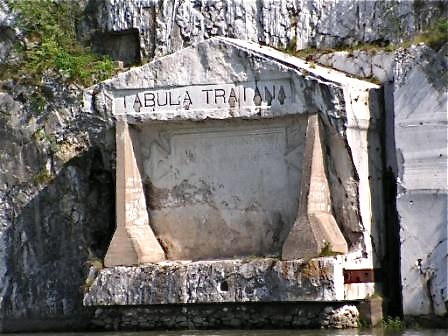

Part 2
#România#Romania#Transilvania#Transylvania#Muntenia#Banat#Oltenia#Alba Iulia#Masa Tăcerii#The Table of Silence#Poarta Sărutului#The Gate of the Kiss#Coloana Infinitului#Endless Column#Biserica Neagră#Black Church#Castelul Bran#Bran Castle#Castelul Cantacuzino#Cantacuzino Castle#Castelul Huniazilor#Hunyadi Castle#Castelul Peleș#Peleș Castle#Pelișor#Cazanele Dunării#Orșova#Tabula Traiana#Capul lui Decebal#Decebal's Head
177 notes
·
View notes
Note
Hello! I was curious about what your favourite modern biography of ATG is (if you've been asked this before I haven't found it). I have some time on my hands right now and I would love some new reading material. I've read Greens book and Conquest and Empire by Bosworth and liked both a lot. Would you recommend something specific or maybe more recent? I love reading your posts on here :)
Hmm. Some of the more prominent Macedoniasts haven’t actually written bios, unlike some of the earlier generations. Bosworth’s is good. I like it. Green’s...I take issue with some things, but he makes some really good points. It’s important to remember the original version on which the revised version is based, was written right around the time of the discoveries at Vergina. Similarly, I like Hammond’s ATG: King, Commander, and Statesman, but beware of whitewashing. Don’t bother with his later bio, imo.
Lindsay Adams has a fairly brief one Alexander the Great: Legacy of a Conqueror, that I use in my own ATG class, in part because it’s designed for college undergrads or advanced high school students. What I like about it, other than it’s short, is that it includes more information about Macedonia than some of the other earlier bios. I also use Carol Thomas’s Alexander the Great in His World, as it’s less bio than centering ATG in the larger Macedonian context for my students.
There have been some other more recent bios that I don’t really care for. Paul Cartledge isn’t a Macedonian specialist (he’s “Mr. Sparta”). Worthington...well, I disagree with a lot he’s said. And the Freeman one... he’s not a specialist, and he just turns out bios like a machine. There are a couple others that came out recently, and I don’t even recognize who the person writing it is.
I did just learn Ed Anson is coming out with a (sorta) bio on Philip later this year, Philip II: Father of Alexander the Great (Themes and Issues), which I expect to be very good, as Ed does a lot on Argead Macedonia. That said, and while it’s outdated in many ways, I still like Jack Ellis’s Philip II and Macedonian Imperialism.
Last, for pure analysis of ATG as military leader, John Keegan’s chapter on him in Mask of Command is quite good...but DON’T pay any mind to his description of Macedonian power structures, etc. It’s both simplistic and out of date/plain wrong. And he completely overlooks the role of religion for ATG and in ancient warfare.
One difficulty is just HOW fast things have been changing in our understanding of Macedonia itself, thanks to a rise in archaeology in the region. It should (and is) shifting some perspectives about when “Hellenization” of the region really began. Rather than Philip fulfilling what Archelaos started, it looks now like Philip just resurrected the kingdom after a slump, which had significant earlier contacts both east (via Euboia at Methone) and west (via Corinth at Aiani and Dodona/Epiros).
All that DECENTERS damn Athens. Our problem is that so MUCH of “Greek History” = “Athenian History” to the point that if Athens isn’t involved, it’s perceived as “not important” (in part because it’s not in the surviving historical written record). This gets back to my favorite “saw” in lectures: We’re prisoners of our evidence. And so much of that, especially written, has been dominated by Athens.
To add insult to injury, some of the Athenian narratives about Macedonia (especially by figures such as Demosthenes) worked well for a certain Roman literati writing about Alexander later.
Unfortunately, these narratives were picked up somewhat uncritically by former generations of historians. Increasingly in ATG/Philip/Macedonia studies, we’re trying to question both the Roman overlay, and the Athenian bias. So that’s why it’s important to look at the author of the bios of ATG, as to their awareness of what’s going on in Macedonia these days, both in textual studies, but also the archaeology.
Are they a Macedoniast, or just Joe Blow trying to make a buck writing (Yet Another) biography of Alexander?
Anyway, when it comes to bios on ATG, my best suggestion is to ask who wrote it, and what their specialization is? Does this person regularly write and publish articles in the field? That means do a quick CV (or resume) check. :-) So Green, Bosworth, Hammond (Hamilton, although that bio is now old), Adams, to a lesser degree Thomas, but certainly Anson and Ellis...even Worthington: all deal with Alexander (and Macedonia) regularly and keep up with what OTHER people are saying, in articles.
Joe Blow (I want some money) probably isn’t that aware of current, larger conversations in the field. Their bibliographies are almost always truncated.
18 notes
·
View notes
Photo
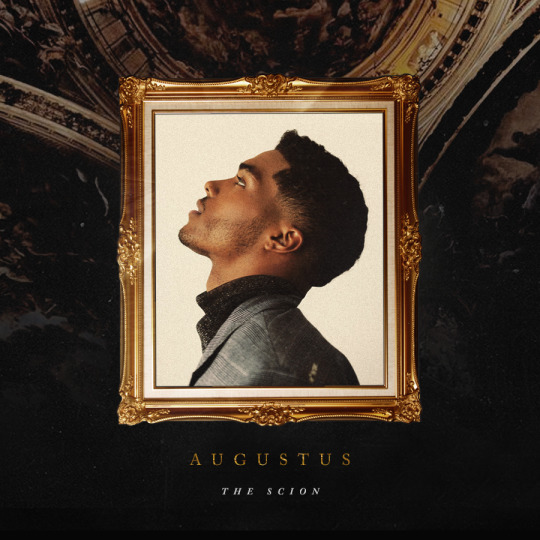

ALL ABOARD ! The HMS PROMETHEAN welcomes AUGUSTUS SUTHERLAND to the expedition in their capacity of THE SCION. They are 24 YEARS OLD & CISMALE and might be painted as ROME FLYNN. When you strike up an acquaintance, address them as HE / HIM. Their deeds on land prece their arrival — people say they are CHARISMATIC, GOOD-NATURED, DAUNTLESS but ARROGANT, RECKLESS, OBSTINATE when the tide turns. Their purpose aboard the Promethean falls in line with “protecting the interests of the Commonwealth and maintaining order”, the pursuit of adventure, chasing the thrill of the unknown and hunger for all that lies beyond the edge of the world.
PINTEREST. / ARCHETYPES, INSPIRATIONS, ORIGIN, WANTED CONNECTIONS BELOW.
I. ARCHETYPES.
beautiful charming himbo™ that is actually super genuine and easygoing and gets along with everyone (much to his haters’ dismay)
super rich kid with the suffocating family legacy looking for a little fun and rebellion
pure of heart!!!!! dumb of ass
longing for purpose and capable of being more than he is beneath all the layers of carefree frat boy and clueless pretty boy
loyal to the death, ride or die for his people (which is most people unless you go out of your way to actively antagonise him)
II. ORIGIN / HEADCANONS.
augustus was named by his grandfather, former admiral of the fleet in her majesty’s royal navy, and a fervent zealot in his glorification of the roman empire and civilisation.
his full name is augustus julius sutherland in case you had any doubts about the full extent of his obsession.
the sutherlands are old, old, old money. (if you traced their genealogy all the way back they don’t truly descend from any house in the peerage but they’ve won the prestige and esteem of nobility through centuries of climbing the ranks of the military and have reaped the accolades, rewards and bestowments of land.) war and conquest runs in their blood. august comes from generations of decorated admirals, generals and commanders.
his parents met when his father’s ship came into port at the bahamas. she’s painted as the exotic temptress that beguiled him with her beauty and feminine wiles because he was engaged at birth to be married to a nice rich white english girl.
august is half-afro-cuban and understands spanish but can’t speak it, having learned the language only through his mother’s lullabies and occasional slips into her native tongue.
august is sheltered growing up from what being mixed truly means — he gets the whispers and stares but it helps being the heir apparent of an extremely powerful and wealthy family. it also helps that he’s very likeable, handsome, good-natured, etc. his mother raises him to treat all people with kindness (with a touch of casual but well-meaning manipulation, it helps to be loved to earn loyalty, after all). as such he’s not raised spoiled rotten and pretentious like most of his peers.
being the embodiment of sunshine he is, he gets along with literally anyone he meets just by sheer force of will and personality — it’s the puppy eyes. he’s respectful, polite and genuinely interested in everyone from all walks of life and doesn’t care about class or station when it comes to making friends.
he’s risen steadily through the ranks of the academy, not out of any particular ambition or necessity but because his family name and presence essentially paved the way. a fact that’s pissed off plenty of people and former comrades-in-arms. if there was one word to describe augustus sutherlands’ life thus far it’d be “effortless”.
august sees his allegiance to the british empire as a perfunctory thing. he’s not bound to the commonwealth, the military, or his rank by any undying sense of duty and obligation and if anything, is quite naive about the realities of the empire and warfare. he’s young, impresssionable, and inclined to the see the best in people and situations. he view of the royal guard and being stationed on the hms promethean is one of adventure and limitless possibility. a means to an end to fulfil his thirst for something greater and more glorious than the mundanity of military life and high society.
III. VIBES / INSPIRATIONS.
— people: dave franco (in most of his movies but especially 21 jump street). michael b. jordan’s general energy and sheer charisma. zac efron in high school musical, not the character, but like his general ‘everyone’s high school crush’ vibe.
— tv: jason mendoza, the good place. joey tribbiani, friends. andy dwyer, parks and recreation.
— film: ferris bueller, ferris bueller’s day off. flynn rider, tangled. johnny storm, marvel.
— literature: peter pan. finnick odair, the hunger games trilogy.
IV. PLOTS / WANTED CONNECTIONS.
fun and chaos, to put it simply. august is always looking for trouble, whether he knows it or not. most of it is harmless but he’s fond of dares, exploring places he shouldn’t be in and doing things he definitely shouldn’t be doing and getting away with it.
literally if you dare him to do anything he is honor-bound by the himbo code to do it.
not sure what the liquor rations are like on hms promethean but fuck it because august will happily get drunk with just about anyone on the ship. he demands drinking games! revelry! stolen moments in the dark
extremely good at finding things — be they lost or contraband that can’t be secured via the quartermaster. perhaps your character has a strange request for something that august can provide.
if a character ever finds themselves overboard, august will be the first man doing a perfect swandive into the water to rescue them, whether they can swim or not
people see august as trustworthy, so he’s privy to a lot of gossip and secrets he otherwise should definitely not be told. he doesn’t have a big mouth but he’s guilty of not treating things seriously enough when he should. those that spill their hearts out to him beware...
august loves a good tale of the adventure and will sit wide-eyed listening for hours to a captivating master storyteller
not to say that august is....... dumb but he’s a little gullible at times and has a fascination with conspiracy theories and mysteries. Loves ghost stories and horror stories
he has an equal affinity for animals as he does with people, he adores them despite being allergic to things with fur. he’ll pet your creatures and spend hours sneezing but he refuses to have regrets (ragrets).
THE CHALLENGER. someone that august can’t seem to charm and bend to his will no matter what he tries. the thorn in his side that sees through all the rich boy bullshit and doesn’t care for it. a person that, against his better judgement, infuriates him because he can’t get a hold of them or why they seem to dislike him so much.
THE SWEETHEART. a guest passenger that’s of the same warm, easygoing sensibility that he clicks with from the first moment. an instant kind of bond and warmth despite their differences in background or life. a person that brings out the big loveable heart in august and sees him for who he is.
THE CATALYST. an older character that’s jaded and hardened and has their eyes completely open to the atrocities and sins of the british empire. a character that confronts august’s worldview and wakes him up, sparks a fire in him that leads to his disillusionment with the empire and the role he plays within it.
12 notes
·
View notes
Text
Fate/Neverland
So, now that I got @sweetylittlebirdie into Fate, and claimed the AU, I think it’s time that I do post something about it. So yes, the TPN kids in the nasuverse ! Let’s go ! (Let’s suffer)

Depending on the point of view, you can decided that the three routes are still separated, or fused in this au. There’s no exact storyline except the canon one in the fateverse. Also I changed a lot of stuff to correspond to each character.
The story is set in England since most of the characters aren’t actually japanese in TPN. (And if you don't know Fate, England in where the Magic Association is settled, that’s why).
The Masters :
Emma Bloodoath : The adoptive daughter of Mujika Bloodoath, a young woman whose past is still mysterious. She is one of the only survivor of the Great Fire that destroyed half of the city she lived in and killed over 100 000 people. Due to that event, she became obsessed with saving others, even if it means killing herself in the process. Since Mujika died during her teen years, she was taken under Yuugo Sander’s wing, the son of the owner of the house she lives in as well as her English teacher. She sees him as an older brother figure and cares about him as much as he cares about her. Since she was born with magical circuits, she insisted on learning how to use magic, but could never truly use it until the Grail War. She is Saber’s master.
Ray Yuugano : A mysterious boy of Emma’s age. Uses the church’s fighting methods but also mages ones, he is registered in none of them. The illegitimate son of one of the church’s nun : Isabella, they both keep that fact a secret for the good of the church. He was born with incredibly good magic circuits, making most people think that his father may have been a great mage. Despite his look, he always carry a rosary made of jewels, each of them filled with a great amount of mana, as well as a mysterious pendant he uses to save Emma when she was almost killed by Lancer. No one knows where this pendant comes from. He also has a laced bracelet on his wrist that seems old and worn out. He is Archer’s master.
Norman Ratri : The heir of a great mage’s family : the Ratri’s. Son of James Ratri, and nephew of Peter Ratri, he was mostly raised by his great-grandmother Legravalima after his father’s death. No one knows what she did to him to make him inherit the Ratri’s powers, but it wasn’t anything good. He has the most powerful magic circuits ever witnessed to this day, but due to that, his health is greatly affected. He is also a genius and competent mage able to use multiple spells at the same time and make familiars operate like small mages. He hides all of that in order to stay close to his best and only friend : Emma. The only accessory he seems to wear is a laced bracelet on his wrist. He is Rider’s master.
Isabella Yuugano : One of the nun’s in the local Church, she is the only person in it that works within the Holy Church, specialized in “Hunting the heresy”. Despite that, she has magical circuits and seems to have mastered some spells as well as she owns a magic crest. No one dares to defy her authority, even knowing that she kept her own son close to her, as it is known that she sees him as nothing but a tool. She says she was transferred from Japan to the Church in England, but she seems to have come to the country for another reason, one that concerns her son’s Birth, as he seemed to have been conceived and born in England. She is Lancer’s master, but seems to also have another servant...
Phil : The results of numerous experimentations on the humans genes, he is not exactly human, but not exactly a homonculus either. His body seems to grow more slowly than expected, making him look like a young child, no one knows his true age. He was made to have some of the best magic circuits ever created (behind Norman), and is a very competent and merciless mage as well. Especially since in the lab he grew up in, no one exactly learned to him what was “good” or “bad”. If he needs to kill, he kills, but if he doesn’t need to, he won’t. He got surprisingly attached to Emma after fighting her, calling her his “older sister”. He is Berserker’s master.
Lucas Glorybell : Emma, Ray and Norman’s History teacher. Like Emma, he is one of the rare Survivor of the Great Fire, and has lost both an arm and a leg during that event. He is also Yuugo’s childhood friend, and cherishes him a lot… To the point of wanting to fight in order to obtain the Holy Grail to wish for Yuugo’s fiancée to be brought back to life. Despite not being a mage, he allows his servant to do anything in order to obtain enough mana for him to be efficient enough to destroy his opponent, even if it means having to kill his own students. Saber says he looks like his master from when he was younger. He is Caster’s Master.
Peter Ratri : Norman’s uncle, and James little brother. He wishes he could have become the heir after his brother’s death, but his magic circuits weren’t good enough for Legravalima, and she chose Norman instead. Unaware of what she makes the younger boy go through, he also abused of him due to the jealousy and anger. When he heard that Norman was chosen to participate in the Holy Grail War, he immediately summons a servant to also participate, without any good success. He seems to be close to Isabella, but with some distance still. He is Assassin’s master.
The Servants :
Saber : Percival (Oliver) : Emma’s servant. One of the night of the round table. He was summoned as his form after finishing his search for the Grail and losing his sister Dindrane, as such, he is more mature than how his legend used to describe him. Emma reminds him a lot of Dindrane, and it’s mostly because of that fact that he decided to swear allegance to her. as his faithful knight, he would do anything she asks him to, obeying each of her orders, but also bringing her back to the right path. Unlike his king, he doesn’t have any particular wish for the Holy Grail, if he does have one, it would be able to stay by Emma’s side even after the war is over.
Archer : ??? (???) : A strange woman hiding her face behind a demon mask. She doesn’t like being bonded as a servant and forced to obey the orders of a “kid”, but despite claiming that she seems to genuinely care a lot about Ray and his well-being, beyond her position as a servant. She is merciless, but refuses to sacrifice innocents for the good of winning the war. She seems to want Emma’s death beyond anything else, and hates her. It seems that her wish for the Holy Grail has already been granted...
Rider : Sekhmet (Barbara) : Despite what the legend says, Sekhmet is actually a demi-goddess. For years she has searched recognition from her father Râ, in vain. When this scrawny boy then acknowledge her as being worth fighting with, she is delighted. This gratitude goes way beyond loyalty to some kind of fanaticism. Some would mistake her for a Berserker, but she is definitely a Rider. Her wish for the Holy Grail would be to be finally accepted by her father as a part of the Ennead, the elite within the egyptian gods.
Lancer : Anansi (Krone) : (Finally a Fate type genderbend) Depicted as a spider, Anansi incarnated herself as a human this time. Despite her change of appearance, she kept her playful personality, mostly wishing to have an entertaining time. But even like that, she still act as a mediator between people like she used to between the gods and the humans during her time. Despite being a good fighter, she still perfer to use schemes to win. Her wish would be to simply
Berserker : Vercingetorix (Giran) : After being robbed of his country, his people, and his life after being humiliated, this symbol of the Celt rebellion against the roman empired was filled with hatred and cursed the people who did all of these to him. He was summoned as a Berserker, and intends to eliminate anyone in his master passages, this young boy reminding him of his children killed during the war. He cherishes him more than anything else.
Caster : Lewis Caroll (Leuvis) : Though his reputation as an author gave him a place to the ‘Throne of Heroes’, how people perceived him during the 70′s distorted his appearance and mind to the one of a monster. He is only the reflection of the man he used to be. His talent as a mage is… well… not the best. But his talent as an ‘universe creator’ is as good as you expect the creator of the Wonderland to be. His wish would be to have his reputation restored.
Assassin : Hassan of the Thousand-miles Sight (Andrew) : (Please don't judge the name, all Hassan’s made in fate are originals, I had to come up with something myself) One of the members of the Hassan, he is said to be able to see a small bird flying miles away, and is not only competent as a spy but also as a sniper. Beware of his attacks which might come from somewhere you don't expect them to be.
For others characters or plot point, don't hesitate to ask ! (^^)/ (People who knows me from the DR fandom knows that I’m a specialist in making killing games now) Thanks for reading !
#the promised neverland#yakusoku no neverland#tpn#ynn#fate#fate stay night#fsn#fate series#Fate Stay Night Unlimited Blade Works#fate stay night heaven's feel#au#crossover#emma#norman#ray#isabella#yuugo#lucas#oliver#krone#phil#peter ratri#barbara#leuvis#lewis#andrew#giran
10 notes
·
View notes
Photo

♬ OverGroove & Viticz - Cilukba (Badoet) ♬
♬ Why So Serious ? - Hans Zimmer ♬
♬ ReCreation - MOKU ♬
♬ Michael Jackson - Is It Scary ♬
♦ Jojo ♦
♦ Charlie Douglas ♦
♦ The Devil / The Devil in Box / It ♦
♦ Several billion years ♦
♦ Come from another dimension ♦
♦ Shapeshifter ♦
♦ Favorite Appearance : A Boxed Devil / Clown ♦
♜ Manipulator ♜ Hungry ♜ Sadistic ♜ Determined ♜ Violent ♜ Screwy ♜ Hypnotic ♜ Unpredictable ♜ Possessive ♜ Good actor.♜
We don’t know anything about Jojo's origins, all we know is that he's part of the same species as Pennywise. Like the dancing clown, It comes from another dimension, and seems to have existed since the dawn of time.
The earliest remains of history known that talks about Jojo date back to Ancient Egypt. Stories tell about a creature residing in a box, or a sarcophagus according to the translations, who took his victims inside to devour them. As soon as the box opened again, despite all his victims, no body exceeded. At that time, Jojo was considered a God to be appeased, the Egyptians made many offerings to him, sacrificing a lot of people. Similar testimonies are also reported a little later in South America, particularly in Maya, Inca, Aztec and many others.
Jojo is forgotten a little time, left in the shadows during the Roman Empire, and had plunged into a phase of hibernation. Unlike Pennywise, Jojo hibernates whenever he wants, or in case of great hunger, and is awake only when a human or an external force causes the opening of his box.
In the Middle Ages, Jojo returns in force, locked in a coffer in Asia, especially in Japan. The folclore of this country relied heavily on Jojo and his many years of prosperity. According to some accounts, Jojo is said to have been the source of the Kappa legend, because he would have hypnotized people who had woken him up and asked them to bring the children back from the riverbanks in the middle of the forest, and eat hem.
Jojo's coffer is stolen by mercenaries at the beginning of the Renaissance, and is taken directly to Europe. The box remained closed until the 19th century. Jojo then takes the form we know today, which is his favorite form, that of a spring-loaded devil in his big box. It’s bought by a circus who decides to use this charming box without suspecting what it contains.
Jojo, clever as he is, hypnotizes the whole circus, which will continue its tours all over Europe for decades, taking away some children, or some other victims to feed It. The circus is arrested after about fifty years, when they decided to start a tour in the United States, and all members are imprisoned for life for child abduction, and surely murder of them.
Except that the real murderer is none other than Jojo, controlling them, and having devoured the hundreds of missing people. The box is handed over to the authorities, and is then sold, like all other objects, to a Cabinet of Curiosity.
Today, this cabinet is closed, its owner having mysteriously disappeared, and having no one to offer the cabinet inheritance, his small store is abandoned.
It’s now in Arkansas, in an old city named Willer. Beware of It if you enter, and if you fall on Its box, under an old dusty cloth. Jojo hibernates because he’s hungry. On its colorful box is the word "OPEN", prompting you to open this box. But just above, is written in red paint "NEVER", scratched repeatedly as to be erased. Nobody knows who painted this word, perhaps the buyer, maybe even that was killed by Jojo, because his body never been found, never nobody had overwhelmed his disappearance.
It's up to you to see what advice you will follow ! Will you open it ?
⬳ Just like Pennywise, the fear of humans gives his meat a better taste, and of course, the easiest people to scare are kids and phobics. But that doesn’t mean he cannot feed on anyone.
⬳ He rarely leaves his box, which is in a way his shell. It’s irreparably linked to him, but can probably move by teleportation (Only once out of hibernation) and dragging on the ground with his box. He can also take a form out of his box, but will have to return there after a week, after this time, Jojo becomes slower, weaker, but remains immortal.
⬳ In his devil form, he cannot remove the spider's legs from his back.
⬳ In the "enraged" mode, sharp teeth push him by hundreds in the mouth, and his smile extends to his ear on one side, and to his forehead of the other by passing accross his eye. His eyes also become multicolored, and mandibles come out of his mouth, just as a long two-colored tongue can also appear.
⬳ It’s also possible for him to hide in any box, in your drawer, in your bag... All that closes and opens, he can hide in.
⬳ He loves to swing in all directions on his spring, just because he finds it funny.
⬳ He likes roasted peanuts.
⬳ He loves black roses. Sometimes his box is filled with it, and he offers it to his future prey.
Jojo © Me
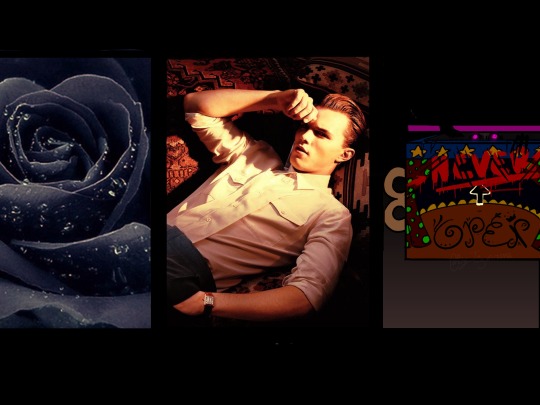
3 notes
·
View notes
Text
People of Action and Scholarly Ones
QUESTION: What are the lessons today’s believers should draw from the following Divine message:
“Believers should not go forth to war all together. But why should not a party from every community of them mobilize to acquire profound, correct knowledge and understanding of the Religion, and warn their people when they return to them so that they may beware (of wrongful attitudes)” (at-Tawbah 9:122).
ANSWER: God Almighty first reveals that it is not correct for all believers to simultaneously go on a military campaign and take part in war. Then He states that a party should stay behind to gain insight into the spirit of religion and that when their people come back from different fronts, these learned ones should guide them with fair exhortation, feed them with religious knowledge, and teach them what they should know; this is because those people who engaged with the enemy during warfare may have failed to receive the religious education they need.
State of the learned ones and success
In the early period of Islam, since believers told people the truth, and represented and expressed justice, they faced attacks by the antagonists of religion. In such a situation, believers could not say to the enemies coming to exterminate them, “Come on, let us sit in the mosque and discuss first.” Even if they did, those enemies, who were fixed on grudge and destruction, would have tried to demolish that mosque and bury the believers therein. In order to stand against such demolition, they fought to protect their chastity, honor, religion, home, and flag.
After the demise of the noble Prophet, peace and blessings be upon him, and during the time of the Rightly Guided Caliphs, may God be pleased with them, similar problems emerged and Muslims had to engage with enemies in different places. During the time of Caliph Abu Bakr they had to fight on eight different fronts in order to repress the cases of apostasy in different tribes. Besides, the Sassanid and Roman empires, which were the super powers of the time, also had their eyes on Muslims. Since they accosted Muslims at every opportunity, Muslims had to fight defensive wars against them in different parts of the world.
In such a situation, had everyone attended war without any exception, there would have been a serious gap in terms of religious education. In the verse mentioned above, God Almighty commands that a group of people should stay behind for scholarly purposes in order to compensate for the lack of knowledge in those who return from war. Thus He pointed out that Muslims must definitely retain their learned state and attain the horizons necessitated by the conditions of their era. If believer fail to attain such a state and horizons, it is not possible to stand against attacks on different fronts anyway.
Cultural envoys
As for the conditions of our era, when knowledge and power of discourse came to the fore, continuing to exist as ourselves will be possible by means of the power of knowledge, pen, and discourse. Therefore, the devoted souls who are the cultural envoys in our time should take their values to different parts of the world—not with weapons and brutal force, but with knowledge, wisdom, love, tolerance, and goodness. The way of peace and love opens the way that leads to hearts, whereas brutal force causes grudge and hatred to rise from the dead. For this reason, unless you remain under invasion and have no any other way but to fight, no solution should by sought through force. As for the issue of using force, it should be evaluated within a perspective of defense or eliminating an inescapable danger.
It is for this reason that the most important duty to be fulfilled with respect to Islam and humanity is going to the four corners of the world, taking our cultural values there, and in the meantime benefitting from different patterns and colors wherever we are, as far as they do not contradict our essential teachings. By coming into contact with different people in the places they go, the devoted souls will both serve as honorary representatives of our cultural values, and they will receive the beautiful sides of those cultures and present them to their own people. However, as they will be predominantly busy with their pursuits of peaceful action, they may not be sufficiently nourished in terms of knowledge and spirituality. Then, it is necessary to edify individuals well-versed in the values of our spiritual heritage, who know our essential sources better, and thus who will help those in the field of peaceful action be nourished as is necessary. Those who undertake the responsibility to deepen in correct and profound knowledge and comprehension of Islam should constantly flow like a pure freshwater spring, nourishing the altruistic souls running in the field, who should in return take what they will from that source and complete their scholarly equipment.
Scholarly ones open to both physical and spiritual disciplines
By referring to acquiring “profound, correct knowledge and understanding of the Religion,” the verse points to the fact that those who stay behind need to be equipped with knowledge pertaining to faith, Islam, and to ihsan, or perfect goodness. Together with that, the sound functioning of these values, their easily being welcome by a society (perhaps of a very different cultural background), and their being liked and valued, depends on correct discernment of non-religious realities and rules as well. Therefore, besides religion, it bears much importance to master the natural sciences, which constitute the basis for most modern sciences. It is important to carry out research in this respect, and behold appreciatively the creation displayed in nature.
While learning religious disciplines on the one hand, modern sciences should not be neglected either. He pointed out that a student’s endeavor would soar only when these two are found together. Excluding one of these two will mean leaving the other devoid of wings. One should neither make concessions from learning religious disciplines, which are the light of the heart, nor ignore modern sciences, which are the light of the mind, reason, and judgment.
In addition, this verse emphasizes the importance of love of knowledge and research. Therefore, one must make very serious efforts in order to master both the religious and modern sciences, and remain like a “student” until the end of their life. The Arabic word for student (talib) means “seeker” of knowledge. No matter whether a person studies religious disciplines or modern sciences, if that person is utilizing the essences distilled from those studies for the sake of knowing God and maintaining a sound balance, then that person will be treated as a true student or seeker of knowledge. So what does such a treatment mean? As the Messenger of God stated, God Almighty makes the way to Paradise easier to one who sets forth demanding to acquire knowledge.
Seeking knowledge is very important and the benefits a scholar can bring to society are great. Thus, one’s society is responsible for supporting seekers of knowledge and doing what they can for them. It is very difficult for someone dedicated to knowledge to devote time for anything else. Accordingly, some Islamic scholars stated that even if they wear expensive clothes and the threshold of their door is made of gold, it is still possible to give alms to seekers of knowledge, because the vitality of a nation depends on such mastering of knowledge. If this cannot be done, the nation will collapse and disintegrate. Due to this stagnancy, some cracks emerged in the Islamic world in the fifth century after the holy migration. With the recession in the 13th and 14th centuries, a complete break down and disintegration happened. We have not been able to straighten up since.
Dignified contentment and remaining under obligation
In response to people’s support and care, seekers of knowledge must do their best in terms of being worthy of such kindness and must not waste a second of their time. Through very serious planning, division of labor, and a discipline of mutual helping, these seekers must be completely focused on this task. They must devote all of their energy to the task so as to be deserving of the people’s regard for them—even if that means sleeping only four hours if necessary and devoting twenty hours of the day to studying. Who knows? When they study with such seriousness, maybe God Almighty will grant them in two years what another person can attain in ten years.
Incidentally, let me share how I feel about one issue: I feel heartbroken for those who go abroad for a PhD, but cannot finish that in even ten years. While the dire need of our country for qualified people is obvious, God will call them to account for wasting so much time. Time is the greatest capital for a human. If a person has taken such a path once, they should persevere, exert their brains, make use of all arguments they can make use of, benefit from all sources they can, and if possible, they should even finish their PhD before the time determined for them.
I wish to underline one more point concerning scholarly ones: Dignified contentment is a very important principle for those dedicated to scholarly pursuits, with respect to the honor of both knowledge and learned ones. Actually, the path of the Prophets is also based on this essential. In many verses of the Qur’an, it is stated that they said,
“I ask of you no wage for that (for conveying God’s Message); my wage is only due from the Lord of the worlds” (ash-Shuara 26:127).
In this respect, scholarly ones should not be obliged to anyone if possible, in any phase of their lives—neither while they are students, nor when they become teachers, or teacher of teachers…
May God forbid, if one does not have this feeling of dignified contentment, and if that person carries out certain tasks for the sake of some returns, such as becoming a manager, director general, MP, minister, or prime minister, then such a person cannot be saved from being obliged to other people. Unfortunately, the concessions they make on account of being obliged will not only cost them dearly, but cost their nation as well. In this respect, those who engage in scholarly pursuits must arrange their lives in accordance with the principle of dignified contentment. They must use the means of their fathers if they can, or they must make a modest living with their own means, if they can. They should live frugally, never becoming obliged to anyone and never having to make concessions.
#allah#god#muhammad#prophet#sunnah#hadith#ayat#quran#revert#convert#religion#reminder#islam#muslim#muslimah#hijab#dua#salah#pray#prayer#welcome to islam#how to convert to islam#new muslim#new revert#new convert#help#revert help#revert help team#convert help#islam help
2 notes
·
View notes
Photo
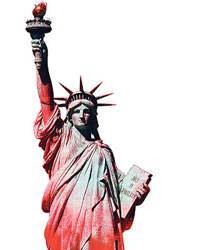
Trumps and the Ides of June
In Roman times, the Ides of March , which fall on March 15th, was the deadline for settling debts. Cesar was warned by a fortune-teller to “Beware the Ides of March” before being assassinated on that day. As 2019 approaches ‘the Ides of June”, the Empire is having not only ‘a constitutional crisis’ in which the President is challenging the ‘checks and balances’ written into the Constitution, it was plunged into an economic crisis, the Dow Jones Index dropping five hundred points after China responded with tit for tat to the President’s raising of import tariffs from 10 to 25%, and Mexico’s new president manouvered successfully to blunt a similar threat over its handling of Central American refugees bound for the US.
Not to mention the latest threats by Secretary of State Pompeo against Iran, marked by the dispatch of a carrier fleet to the Persian Gulf on the basis of ‘rumors’ of bellicose plans (not ‘intelligence, mind you, notwithstanding the existence of the ‘Five Eyes’ grouping the US with Great Britain, Canada, Australia and New Zealand) having required him to stop off in Brussels to clear his decision with the US’s European allies, who would be on the second lines of a Persian Gulf war, before traveling to Moscow to sort all this out with President Putin, Iran’s closest ally.
It was only a matter of time before it became clear to Washington that the rest of the world would eventually dump the dollar to free itself from the US’s punishing sanctions, which are based on the fact that world trade revolves around that currency. Or that Xi’s China, fast approaching parity with the US in economic terms, would lead the way, just as President Putin’s Russia protects countries such as Venezuela when the US decides to seek ‘regime change’.
Until now, even American news junkies have been left unaware of the depth and breadth of the Russia-China alliance, however that may finally change. As newscasters spend hours opining on the relative chances of the 20-odd Democratic candidates for the 2020 presidential election, in which they hope to defeat Trump, Secretary Pompeo and the even more bellicose National Security Advisor John Bolton (he of the walrus mustache) essentially take over military decisions from the president (together with a Pentagon backed by the arms industry), threatening not only Israel’s enemy Iran, but also to oust the democratically elected Venezuelan President and put a hand-picked upstart in control of its vast supply of oil, the Dow Jones Index has been gyrating wildly and the CEO of one of the most successful hedge funds joined the chorus of prominent Americans coming out in favor of ‘reforming’ capitalism’. The problem is that in the American lexicon, social democracy (as well as the Greens) are tagged as ‘far left’.
Similarly, as the country ramps up for presidential elections which are more than a year away, it’s difficult to believe that any of the well-meaning Democratic candidates will be a match for a Deep State determined to wage the Empire’s final – nuclear – wars.
1 note
·
View note
Text
January 13, 2019 - “Our Confidence in God” Psalm 27
Click KEEP READING to read the full sermon.
Introduction
When I was a little child I envied the maturity and wisdom of an adult. Now that I am old I yearned for the innocence and calmness of a child. I am not alone on this personal quest. As we grow in years we always go back to our childhood. As a child we enjoy the simplicity of life and the contentment of little things. Above all, as a child we manifest our solid trust and total dependence upon our parents. It is a humbling process for us to note that our Lord Jesus Christ gives primary significance of such childhood virtues for us to enter the kingdom of God. In every stage from childhood to adulthood, we make an amazing discovery that the sense of wholeness and fulfilment in life is anchored upon our full confidence in God like that of the simple faith of a little child.
One of the family pictures I cherish is when my son as a baby rested upon my breast undisturbed and sound asleep. Such ordinary setting is a great joy for me as a father. It portrays the close connection between me and my son. And such intimate affection is what I deeply yearn and at times greatly miss as my son grows older through the years. It is interesting that now that I am old, I still long for the warm and loving embrace of my father and mother, especially when I am in pain and in tears. I am fully convinced such intimate bond is the grand design of our Father in heaven for us all his children. Is it not his pure delight when we simply yet humbly come to him and lean on and rest in his presence as we unreservedly entrust to him our whole being and all our cares? Indeed, it is good for us to embrace and nurture the simplicity of life and the solid faith in the LORD our God like that of a little child.
King David composed a song of prayer declaring his confidence in God. Like the psalmist, we are safe in the Lord’s hands (27:1-3). We rest in his presence (vs. 4-6). We are secure in his compassion (vs. 7-12). And we are stable in his goodness (vs. 13-14). May this song be our prayer.
A. Safe in His Hands (27:1-3)
We can be sure of our safety when we entrust our lives in the hands of God. David, as a shepherd and king, faced life and death as he tended his flock and governed his people. On the frontline to protect his flock and to lead his people, his life was at stake in the midst of danger. God was his firm stronghold and great defender.
1. Our Firm Stronghold
David was shielded in the safekeeping hands of God.
“The Lord is my light and my salvation—whom shall I fear? The Lord is the stronghold of my life—of whom shall I be afraid?” (27:1)
A stronghold is a citadel or fortress. In ancient times a city was fortified by massive walls for the safety and security of the people. David knew God as the stronghold of his life. As a shepherd his life was at risk before ferocious beasts. As a king his life was in danger before hostile enemies. Yet in the hands of God he was safe and secure. In solid confidence he declared, “Of whom shall I be afraid?”
In this dark and sinful world driven by selfishness, pride and greed, in our decisive stand for what is true, right and just, we brace ourselves to be despised, maligned and slandered. There are those who dearly offered their lives in their unbreakable will to be faithful to God and his cause. The cowards are man pleasers who compromise their moral standards to their own disgrace. The brave are the morally upright who can face anyone without fear for their testimony is a powerful light in darkness.
2. Our Great Defender
In integrity, God is on our side. David knew God as his great defence.
“When evil men advance against me to devour my flesh, when my enemies and foes attack me they will stumble and fall. Though an army besiege me, my heart will not fear; though war break out against me, even then will I be confident.” (27:2-3)
Anyone whom God sets apart to make a godly difference in this crooked and corrupted world will surely be opposed and attacked by unprincipled man or woman who loves darkness instead of light. King David was under siege on every side to destroy his name and to unseat him from his throne. Yet he must beware that his fierce battle field was more than sword and might in the hands of his enemies but the sinfulness and deceitfulness of the human heart. As long as he stood for righteousness, God was on his side. It was on this moral ground that David killed the giant Goliath who defied the God of Israel. But when he cherished sin in his heart, surely he would not escape the righteous judgment of God. It was on this moral breakdown that Nathan confronted him of his adultery and murder that eventually resulted in the staggering crisis inside his family and the bloody civil war in his kingdom. The great lesson for David to anchor his confidence in God came with such a great price.
Likewise, our fierce battlefield in life stands upon a moral ground. Once we compromise our biblical principles we can be sure that God will deal with us so we can come to our own senses. When we defy God and spurn his Word we do much damage to our soul and pierce our heart with grief. But when we make our moral stand for truth, righteousness and justice, we can be certain that God himself will fight for us and vindicate our cause. When we make a decisive stand upon our moral foundation, we can make a godly influence as salt and light in this fallen world. Our true knowledge of God is anchored upon the Scriptures. God gives us the spiritual discernment to embrace what is true and reject what is false. God himself sustains us with moral courage to love what is good and hate evil. Once we yield our whole being under the Lordship of Christ with a firm resolve to do what is true, right and just, the powers of darkness are actively at work to discourage and destroy us. What must we do? We guard our hearts and rest in God to protect and defend us.
B. Restful in His Presence (27:4-6)
God alone is our blessed shalom. In him we can find the wholeness and fullness of life. The Lord is our greatest joy and our hiding place and to whom we offer our grateful praise. King David, in all his pains and tears, found rest in the presence of God.
1. Our Greatest Joy
There is no greater joy in life but to behold the beauty and glory of God. This glorious end captivated the heart of David.
“One thing I ask from the Lord, this is what I seek: that I may dwell in the house of the Lord all the days of my life, to gaze upon the beauty of the Lord and to seek him in his temple.” (27:4)
In our darkest moments we can have a better vision of the awesome beauty of God. This was true to David. As a father and king, he pierced his heart with unspeakable grief when he greatly suffered from his grievous sins. In his power he committed adultery that resulted into murder in his scheme to cover up his outrageous misdeed. As a consequence, his home was wrecked and his kingdom was divided. In the agony of his soul and the outcry of his guilt, he had no one to turn to for forgiveness and healing but to his God whom he deeply hurt. In his brokenness he cried out to God who restored him close to his heart. In deep gratitude and intimate communion with the LORD, David desired only one thing in life. It is to dwell in the glorious presence of God and to behold his unfading beauty for the rest of his life.
We are invited at Calvary. The cross of Christ is the most dreadful sight in the world. In the Roman world, the cross was the worst object of terror. Anyone hanged on the cross was cursed. The ancient world crucified the One whom they condemned of blasphemy against God and rebellion against the empire. Heaven was terrified for sinful mortals to have crucified the Son of God! At broad daylight at noon there was darkness in the land. Yet who would have thought in the midst of horrible darkness was the glorious light of the saving grace of God? For the One whom we all crucified is the Lamb of God who takes away the sin of the world. And to every sinner who looks up to Christ with a humble heart to be right with God can rest in his glorious presence now and for all eternity. At the cross of Christ we can behold the unveiled beauty of heaven on earth. Jesus is the Christ, the Savior of the world and the Lord of all. As we enthrone Jesus into our hearts, in gratitude we can sing with David for us to dwell in the glorious presence of the LORD and to gaze upon his perfect beauty all the days of our lives.
2. Our Hiding Place
In our lowly estate, God redeems us from our pit of sinfulness and brokenness and draws us to his presence with peaceful rest.
“For in the day of trouble he will keep me safe in his dwelling; he will hide me in the shelter of his tabernacle; and set me high upon a rock.” (27:5)
We need to stop running away from God and find our way home back to his loving embrace. We pierce our hearts with grief if we cherish sin and harden our heart. David had concealed his sin and was restless until he made things right with God. The Lord had forgiven David and restored him to his kingdom and kept him safe from all his enemies.
3. Our Grateful Praise
In coming home to God with a humble and contrite heart, we can dwell in his loving presence with a wholesome rest. If we do, like David, we can sing to the LORD to worship him with a grateful heart.
“Then my head will be exalted above the enemies who surround me;
at his tabernacle I will sacrifice with shouts of joy; I will sing and make music to the Lord.” (27:6)
C. Secure in His Compassion (27:7-12)
If God would only make a list of our sins and count them against us, no one could ever stand before his holy presence. And when God extends his grace upon us we must be careful not to use his loving kindness as a license to sin. Despite our waywardness, God affirms his love for us so we can be serious with sin and do what is right. Under the compassion of God we are safe and secure. In coming home back to God, like David, we yield our all to him with earnest pleadings.
1. Our Plea for Restoration
In all our sinfulness and waywardness, with David, we make our humble plea that the LORD extends his mercy and be gracious to receive us.
“Hear my voice when I call, Lord; be merciful to me and answer me. My heart says of you, ‘Seek his face!’ Your face, Lord, I will seek. Do not hide your face from me, do not turn your servant away in anger; you have been my helper. Do not reject me or forsake me, O God my Savior. Though my father and mother forsake me, the Lord will receive me.” (27:7-10)
This could be the most desperate pleading of David. In the gravity and grievousness of his adultery and murder, he knew that he deserved death. He knew he lost his moral right to remain as the king. And he yielded that God alone had the final word for his life and destiny. Yet in the wretchedness of his soul his heart cried out to God. Despite the horrible nightmare because of his outrageous sins, he dearly held on to God not to give up on him and cast him away. Like a man in his death bed grasping for his final word, David made an earnest plea, “Do not reject me or forsake me, O God my Savior.” The world could have closed its door on him. God alone could welcome him. At the end of the rope, in his intimate knowledge of God he firmly held onto him as his ultimate lifeline. His personal pleading was like his last breathe, “Though my father and mother forsake me, the LORD will receive me.”
When our beloved son or daughter commits a grievous sin and deeply breaks our hearts, as a father or mother, do we not yearn for the homecoming of our beloved child back to us? Unfortunately, there are extreme cases that defy the norm for a parent’s heart when a father and mother could close the door of the home for their rebellious child. Sad to say, because of the deep pain that parents bear, out of bitterness it is possible that the door of the home remains closed even for a repentant son or daughter. David was truly grateful that his God in heaven, and the Father of us all, is not a bitter human parent who is unwilling to forgive. This calls much searching of the heart. As fathers and mothers, how much do we love our children? And as sons and daughters, how much do we love our parents?
2. Our Pursuit for Godliness
When we all find our home back to God, like David, may we have a fresh start and be circumspect to live an upright heart.
“Teach me your way, O Lord; lead me in a straight path because of my oppressors.” (27:11)
When God points to our sin, may we not harden our heart. When God deals with our sin, may our soul not be embittered. When God forgives us of our sin, may we be careful to do what is righteous. And when we are tempted to get even against our oppressors, may we resolve to repay good for evil and hold on to the righteous judgments of God. May we have a teachable heart and walk in the paths of righteousness.
3. Our Petition for Protection
In keeping ourselves pure, like David, we also plead that our enemies will not triumph over us. “Do not turn me over to the desire of my foes, for false witnesses rise up against me, breathing out violence” (v. 12). It is a given that there will always be people who will despise us and bent to harm us. May God protect us from evil and keep us from bitterness.
D. Stable in His Goodness (27:13-14)
We could have done our worst in life and suffer its dire consequences. Or someone could have done evil against us and we are grieving inside. In our bewildered estate we wonder if there is a way out. David sinned that devastated his life. Yet God rebuilt his broken life. God turns on the light in the darkness of our lives. And he is able to work out all things for our good if we yield our all to him. Those who are stable are seasoned with the painful realities in life. In the goodness of the LORD we can stand up on our feet and go on in life with a renewed hope.
1. Our Gracious God
In the richness of the grace of God, like David, we are reassured that his only desire for us is for our ultimate good.
“I am still confident of this: I will see the goodness of the Lord in the land of the living.” (27:13)
Think of the bad thing we had done and the evil done to us and how it had made us a better and stronger person in the image of Christ. There are great lessons in life we could hardly learn if we had not gone through such a painful process. We can be certain that nothing happens to us outside the knowledge of God and he is able to orchestrate all things for our good if only we allow him to finish his work in our lives.
2. Our Unfailing God
Our sovereign God is worthy of our trust. He is true and trustworthy. Though so many times we have failed him yet we can be sure that he will never fail us. We may not fully understand the movements of God. Yet behind the scenes he silently moves to finish the good work he began in our lives. God works in wonders beyond our grasp. “Wait for the Lord; be strong and take heart and wait for the Lord” (27:14).
Conclusion
In our journey in life we can learn great lessons from a little child. The innocence, confidence and dependence of a child are precious virtues of great delight. Our Lord Jesus Christ speaks so well that the kingdom of God belongs to anyone who trusts in him with all his heart and firmly hold onto his hands like that of a little child. In the beautiful song of David we are called to anchor our whole being in God. Why do we fix our eyes on God?
We are safe in his hands. “The Lord is the stronghold of my life—of whom shall I be afraid?” When we do what is right there will always be crooked people who will malign and destroy us. God will defend us and vindicate our cause. In yielding our all to the Lord it can cost our lives. Yet now and for eternity we are sure that no one can ever snatch us from the hands of God.
We are restful in his presence. “One thing I ask from the Lord, this is what I seek: that I may dwell in the house of the Lord all the days of my life, to gaze upon the beauty of the Lord.” As light shines in darkness we can behold the grace and glory of God in our brokenness, trials and tribulations. In all our sorrows and pains we find solace in the loving embrace of God.
We are secure in his compassion. “Do not reject me or forsake me, O God my Savior. Though my father and mother forsake me, the Lord will receive me.” We grieve in our sin in breaking the heart of God and may entertain the thought we no longer deserve to be his child. The world can close its door to us. At the cross of Christ we stand and find our home back to God.
We are stable in his goodness. “I am still confident of this: I will see the goodness of the Lord in the land of the living.” Hidden beneath the rocks on earth are treasured gold. Our greatest treasure in life is God himself who silently works for our ultimate good in the darkest moments of our lives. As we grow older we can better appreciate what it means to be a little child.
2 notes
·
View notes
Photo
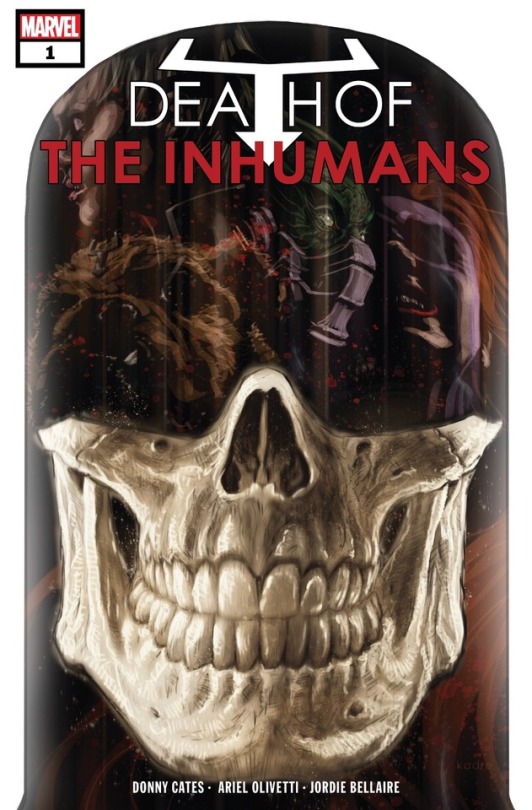
Death of The Inhumans #1 Review
spoilers spoilers spoilers spoilers spoilers spoilers spoilers spoilers spoilers
It’s the beginning of the end. Co-conspirers Donny Cates, Ariel Olivetti and Jordie Bellaire begin their tale of the fall of House Boltigon and this first issue very much lives up to its ominous title. Recap and review following the jump. Beware, major spoilers and some significant characters deaths are entailed!
The story begins with a quick brush-up on the history of the Inhumans. A refresher for those readers well aware of this history as well as necessary backstory for those relatively new to the mythos of The Inhumans.
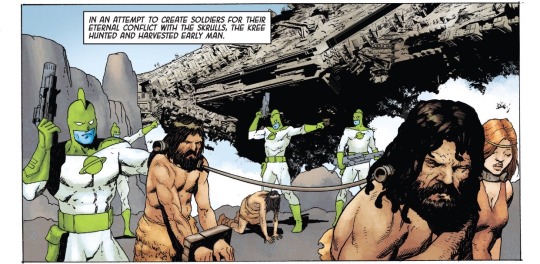
Centuries ago, The Kree Empire was still very much in the midst of their millennia-long war with The Skrulls. Desperate to devise new weapons to use against their enemies, Kree scientists traverse the galaxy in search of planets with life in their more nascent stages. They gathered samples of these lifeforms and conducted genetic alterations, combining the DNA of the beings with genetic material derived from the cosmic deities known as The Celestials. The byproduct was a group of powerful hybrid races that came to be called Inhumans.

Before the Kree could unleash these new weapons on their Skrull adversaries, however, an ancient prophecy was discovered… a prophecy that foretold that the Empire would be torn asunder and brought down by a being of their own making. In light of of this prophecy, the Kree decided to end their experiments and destroy the progeny that their meddling had created. All but five such Inhuman races were culled. Those that managed to avoid destruction included the Inhumans of the Centauri system, those of the Badoon home-world, those among the equine Kymellians, those of Wraithworld, and finally The Inhumans of Earth.

That was then... Much has changed for The Empire in the ensuring centuries. Their war with Skrulls had ended, a new war against the Shi’Ar was waged, and then their home planet was ravaged to point of utter destruction by creatures empowered by The Black Vortex. The Kree were scattered to different refugee settlements across the cosmos… the empire was but a sliver of what it once was. The time for fearing ancient prophecies has long since past and a new power has risen among the ranks of the scattered Kree, a power that will stop at nothing to return the empire to its former glory. And to achieve this end, a force has been dispatched to gather what is viewed as their property.
The Inhumans were bred to be dutiful slaves and deadly weapons of The Kree. And the forces sent to recruit the Inhumans have gone about their duty with brutal, vicious alacrity. The choice forced unto these Inhumans has been simple and deadly succinct: fall in line with the Empire or perish... join or die!

Those Inhumans unaffiliated with the five tribes were the first to fall in this bloody campaign, their bodies cast off into the void of space with command to join or die carved into the dead bodies.
Having become aware of this, the five tribes of Inhumans have come together to discuss this matter, to formulate a plan to address this dire threat that faces them all. A conference was arranged on an undocumented alien planet so remote that not event the teleporting Lockjaw could find it.
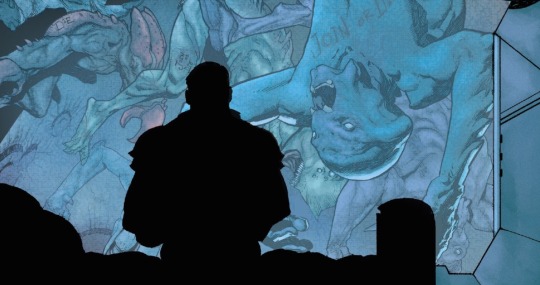
Traveling to this planet, King Black Bolt takes note of the dozens of Inhumans who have already perished in the initial salvo of the Kree’s campaign. It is not clear how Black Bolt had once again assumed the mantle of king.
Last seen Black Bolt had lost his throne to former wife, Medusa. Likewise, his lieutenant, Gorgon was lost on the World Farm of The Progenitors. These matters are left unaddressed and readers will just have to imagine that the story-points were somehow figured out between now and the last time we saw The Royals. As it stands, Gorgon is back and Black Bolt is once more king.
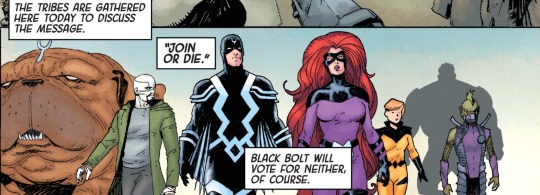
Viewing footage of the murdered Inhumans, Black Bolt makes entry in a ledger. He will not let these souls be forgotten. He will transcribe their names in his ledger and honor their sacrifice. His mournful meditation is disturbed by his wife, Medusa who has announced that they have arrived at the secretive confab where they will discuss strategy with the Universal Queens.
There was a time that these queens considered Black Bolt their liege, their Midnight King destined to lead them on a conquest of the galaxy. And Black Bolt appears confident that they will follow him once more. The Kree has issued their ultimatum of joining the Empire or perish. Black Bolt will choose neither… he will opt for a third option: fight back.
But he is too late.

The Kree Forces had somehow learned of this conference and arrived their first. The four queens and their procession have all been slaughtered. The queens themselves butchered and strung up in a gruesome display. It is a gristly and horrifying site.
Triton notices that at least one of the victims still clings to life. She appear to be a Badoon Inhuman who possess psychic powers and she uses this skill to show Triton what had transpired.
Triton relays what he sees in this psychic vision. The Universal Queens had appraised the threat facing their people and ultimately chose to join The Kree. The threat of their people being slaughtered was too great and they opted to pledge fealty to the Empire.
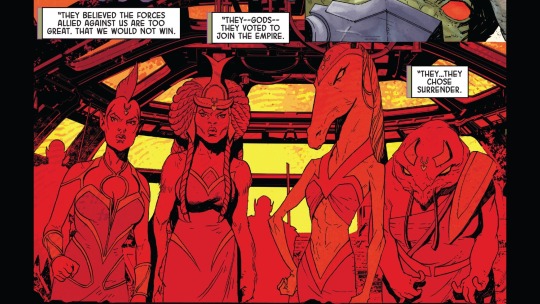
And yet it did not matter. A monstrous lieutenant was leading The Kree forces. He wasn’t interested in these queens nor their people. It was Black Bolt, whom he was truly interested in; and he slaughtered the queens and their persecution merely as a means to send and a cruel and daunting message to the Midnight King.
As Triton tries to ease the pain of this sole survivor, he noticed that a device had been attached to her side. He quickly detects that it is a trap, an incendiary bomb. It is too late for Triton and he uses his last breaths to warn the others to stay back.
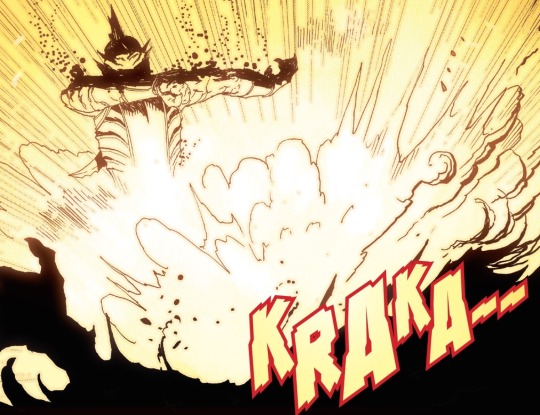
The bomb detonates and poor Triton is obliterated. Medusa is also gravely wounded by the shrapnel.

There is no time to mourn their fallen cousin. If the Kree had known of this secretive conference, then their next move is clearly to lay siege to Inhuman citadel of New Artctillan. They rush back to the craft and fire off in a desperate effort to make it to the earth’s moon… knowing that they are likely to be too late.
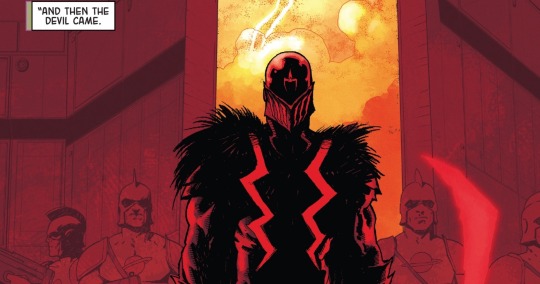
The narrative switches back the lunar settlement of Arctillan where it is revealed that the Roaylas are indeed too late. Kree forces have laid siege to the city, led by a patchwork monster known as Vox. Kree science has created this being, sewing together the various attributes of the some of the more powerful Inhumans. He is as deadly as he is merciless, cutting through the Inhuman forces with his scythe. With Kree soldiers blasting away with their laser rifles any who manage to evade Vox’s path of carnage. The Inhumans known as Naja, Sterlion and Glass Lass lay lifelessly on the ground. Their fellow Inhuman, Flagman, makes valiant stand against Vox, but he too falls quickly to Vox’s scythe.
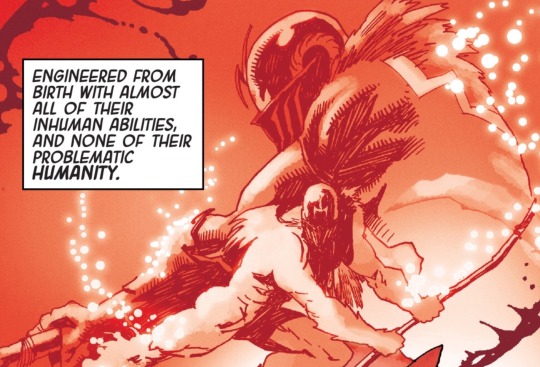
Finally, Vox finds an adversary more on par with his deadly skill as a massive laser blast fires off and sends him careening. Maximus introduces himself, sitting atop the royal throne holding a ridiculously large energy rifle.
Vox is none too pleased with Max’s prattling.
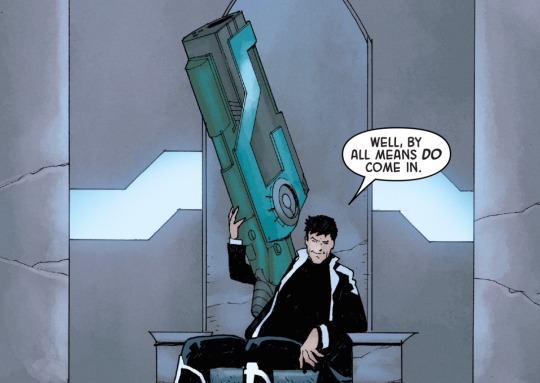
The villain had cut through the less powerful Inhumans wit his scythe, but now it is time that he use his true power. His mouth plate lows, revealing a skinless jaw, and he mutters the words ‘that is enough.’ And in so doing unleashes a sonic wave potentially on par with that possessed by Black Bolt.
A wave of energy fires forward from Vox’s mouth, dissolving Maximus’ rifle as well as a good portion of the mad prince’s arm.

Back aboard the Royal Family’s vessel, Black Bolt attends to Medusa’s injuries. She is in a healing pod and pleads with her husband that he do whatever he can to save their people. He knows what he must do. Venturing to the aft region of the ship, Black Bolt fastens himself into a harness and releases his sonic powers… creating a detonation that fires the ship forward at an incredible speed.
It is not long before they are close enough That Lockjaw can teleport ahead. He does so, and appears in time to save a wounded Maximus from certain death. Lockjaw fights valiantly, but even he is no match for Vox’s awesome power. Once more the villain unleashes his sonic powers and both Maximus and Lockjaw are apparently killed.
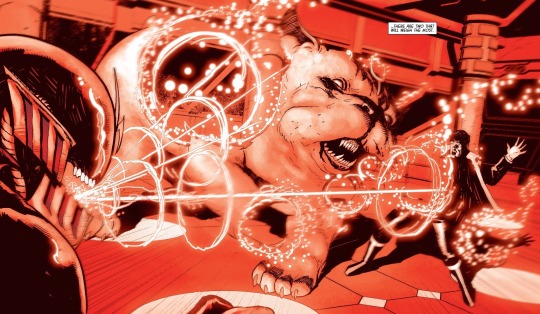
Black Bolt will list and mourn for all of his fellow Inhumans who have perished, yet there are two in particular whose deaths will surely affect him the most… his brother Maximus and his loyal, lifelong companion, Lockjaw…
The battle is over by the time the Royals’ vessel finally makes it to Arctillan. The city is in ruins, its subjects are dead. Black Bolt and the others can only take in the destruction and mourn. Overwhelmed by the destruction and carnage, Back Bolt cannot help but be reminded of the human tale of The Roman Empire… about a great and powerful nation that was built over the course of generations, and then burned in but a day.
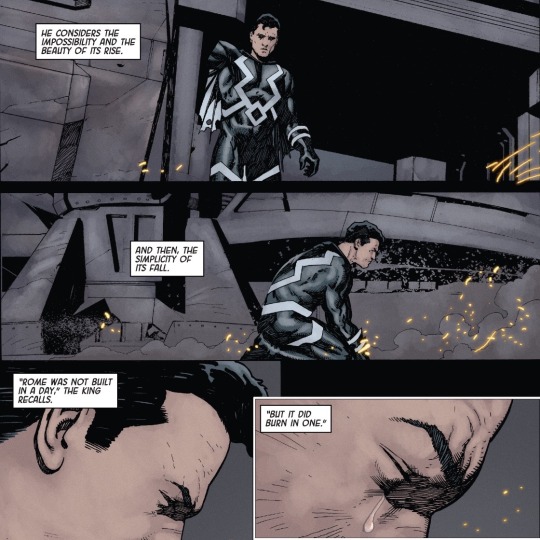
And it is on this somber note that this first, bloody issue comes to a conclusion; to be continued in the next installment.
As an Inhuman superfan, it isn’t really possible for me to offer up an unbiased appraisal of this issue. The art by Arile Olivetti is pretty terrific, with cool action and a fluid movement that propels the narrative forward at an appropriately accelerated speed. And Jordie Bellaire’s coloring is, as always, flawless. Her decision to utilize a drastically different color scheme for the scenes on New Arctillan works quite well, offering up Vox’s killing spree a distinctively nightmarish quality with bloody shades of crimson.

There’s a good economy to how Cates arranges this first issue. He moves things forward quickly, but in a fashion that doesn’t cut corners. Offering up a very succinct summery of the origin of The Kree and Inhumans, but not lingering there before jumping into the action.
And I’m glad that Cates has taken note of the character development Black Bolt went through in course of his solo series by Ahmed and Ward. Blkackgarr is no longer a stoic, withholding sort. He allows himself to feel the pain and sorrow for the fellow Inhumans who have perished, listing their names lest they be forgotten and very much acknowledging that his brother and dog’s deaths will be the matters that pain him the most.
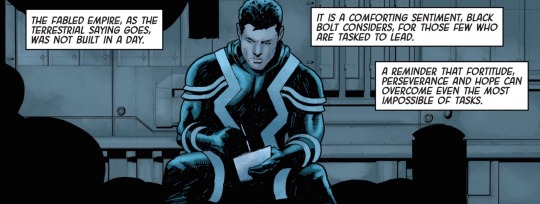
The sense of parallel between The Inhumans of Attilan and the ancient Roman Empire is something had had been evident right from the beginning, with the Inhumans’ first introduction in the pages of Lee and Kirby’s run on Fantastic Four. It makes for an interesting sense of bookending... that the end should along with the beginning.
And I’m quite pleased that Black Bolt is using sign language. His not using sign in many previous tales has been something that’s irked me for a long while.
BB, Crystal and, to a lessor extent, Maximus are really the only characters who are given significant dialogue. This dialogue is pretty good, with each character give a distinctive voice that gels with the characters and their pre-existing sense of character.
Karnak and Gorgon are left a bit perfunctory and not given much to do. Hopefully the pair will be a bit more involved in subsequent chapters. And Triton is there just to die (alas poor Fishstick, I’ll miss you).
Speaking of deaths, killing Maximus is a bold (and I think foolish) choice. The sense of wildcard instability that Max brings out has quite often acted to offer a great sense of dynamic tension in Inhuman tales. Getting rid of him right from the start seems like an odd choice.
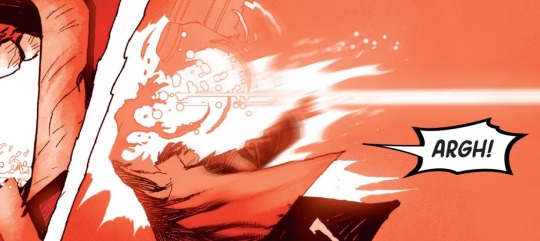
Which brings me to the one death that I simply cannot abide… How dare you kill Lockjaw?!? This is unforgivable.
Un-Forgive-Able…
And unless Mr. Cates can devise some means of bringing Lockjaw back to life before this series has reached its conclusion he will have earned himself an enemy for life.

For all the anticipatory build up of who this Vox character is, he remains something of a cypher. We learn that he is a creation of the Kree and has been imbued with many of the powers of The Inhumans, but that is about it. Have the Kree always possessed the technology to create such a formidable foot soldier, and if so why haven’t they done so before? Hopefully this questions will be more fully addressed as the story continues. As it stands, he comes across as yet another over-powered, under-developed character wherein a writer uses the tired, hackneyed shortcut of trying to make a new villain seem way cool by having them kill off important characters.
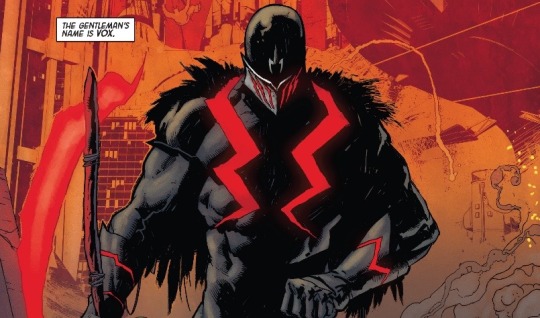
So where does the tale go from here? There is only a small handful of Inhumans left. I doubt Black Bolt and the gang will go to earth to recruit reinforcements among the newer Inhumans (or NuHumans)… Ms. Marvel, Moon Girl and Inferno seem to have their own thing going on In Marvel Rising. My guess is that the tale will continue to center on Black Bolt, Crystal, Karnak and Gorgon (with Medusa still convalescing from her wounds). How will the four go about extracting revenge on a cosmic empire?
As much as I am saddened and angered by the character deaths, I am still looking forward to seeing how things progress.
I recommend this book, but only to those with a strong stomach for fictional characters dying. The carnage notwithstanding, it is a compelling story with truly excellent art and some good sci-fi action.
I’ll give it two separate Lockjaw scores. Three and a half out four Lockjaws as the official rating...

...and a beforehand unheard of zero out of five Lockjaws based on the fact that Lockjaw died.

19 notes
·
View notes